- Book Category Tool
- Gadgets and Gizmos
- All About Me

Book Review: ‘Ikigai’ By Héctor García and Francesc Miralles
- by Sam Howard

‘Ikigai: The Japanese Secret To A Long And Happy Life’ by Héctor García and Francesc Miralles is about living lightly and purposefully, doing things that make you happy. It draws on relevant research and lived experiences to point out fulfilling ways of living – or simply, to show us the “ikigai” way of life.
I picked up this book because I wanted to find out the exact meaning of the word ‘ikigai’ – I was curious because it has no direct English translation and, like any writer, I’m intrigued by fascinating words. To my delight, I came away with more than just the meaning of the word after reading the book.

- Authors – Héctor García, Francesc Miralles
- Genre/Sub-genre – Self-help, non fiction, philosophy, psychology, personal development, health, spirituality, productivity
- Content warnings – N/A
- Type – Standalone
- First publication – April, 2016
- No. of pages – 208
- Goodreads rating – 3.74
‘Ikigai’ Overview
‘Ikigai’ explores what it means to have a purpose or meaning in life drawing from relevant research in psychology, spirituality, and philosophy with commentary from lived experiences.
The authors Héctor García and Francesc Miralles travel to Okinawa, Japan to discover the secret behind Okinawa residents’ longevity. There, they find a way of communal living filled with purpose, happiness, and good health that they share alongside interviews with the Okinawans and practical tips for a good life.
‘Ikigai’ Book Review
Basically, “Ikigai” is a Japanese concept that loosely translates to mean ‘the reason to live’, ‘the thing that makes life worth living,’ or according to the authors Héctor García and Francesc Miralles, “the happiness of always being busy.”
Now, this seemed a little contradictory to me because ‘always being busy’ does not (at all) inspire happiness in me so I was curious as to how this concept became so popular. I was even more intrigued when the authors tied ‘ikigai’ to longevity:
“Those who study why the inhabitants of this island in the south of Japan [Okinawa] live longer than people anywhere else in the world believe that one of the keys—in addition to a healthful diet, a simple life in the outdoors, green tea, and then subtropical climate (its average temperature is like that of Hawaii)—is the ikigai that shapes their lives.” – Prologue
A purpose that makes life worth living and in fact, extends it, was a fascinating concept to me because a few years ago, I wasn’t exactly thrilled about having no real purpose in my work. This lack of contentment even seeped into my personal life where I stopped finding joy with people close to my heart and in my hobbies. So the way the authors – and the Okinawans – defined “ikigai” was relatable and personal:
“According to those born on Okinawa, the island with the most centenarians in the world, our ikigai is the reason we get up in the morning…Having a clearly defined ikigai brings satisfaction, happiness, and meaning to our lives.” – Chapter 1
The authors expand on this concept drawing from Viktor Frankl’s logotherapy and Shoma Morita’s Morita therapy that focus on finding the meaning of life (the former) and working with one’s feelings and desire to find purpose in life (the latter).
I found those theories interesting, but my favorite part of the book was the chapter about ‘flow.’
“…the heart of Mihaly Csikszentmihalyi’s research into the experience of being completely immersed in what we are doing. Csikszentmihalyi called this state “flow,” and described it as the pleasure, delight, creativity, and process when we are completely immersed in life.” – Chapter 3
I could relate to this state of immersion because it happens when I’m reading a book that takes me far into a world of its own or when I’m writing a piece that captures my attention that the world falls behind and only the sound of tapping keys remains. The ‘flow’ got me thinking about the “ikigai” and how it’s described as “the happiness of always being busy.” I’ll admit, it made me realize how always being busy and being happy is entirely possible, because I’m happy when I read or write – I was just defaulting into the idea that ‘always being busy’ means being stressful and under pressure all the time.
So instead of looking at “ikigai” as having to be busy, I understood it to be about enjoying being busy and unhurried–especially inspired by the centenarians from the village of Ogimi in the island of Okinawa. In an interview, an elderly Ogimi resident says that their secret to a long life is slowing down:
“Doing many different things everyday. Always staying busy, but doing one thing at a time, without getting overwhelmed.” – Chapter 6
The interviews with the people of Ogimi also highlight the importance of cultivating good habits, consuming healthy food, nurturing friendships, and being optimistic in order to lead a long, fulfilled life.
I loved the wealth of information packed into the book, and also the glimpse into life on Okinawa island, but I felt the authors spent a lot of time on drawing from other research instead of focusing on “ikigai.” I was waiting till they shared a comprehensive guide into finding our own “ikigai” but it never came, and I felt a little let down because the book didn’t deliver what its title promised. Now, something I thought was really neat was when I learned the author duo has published a follow-up book called ‘ The Ikigai Journey ’ and it fills in this missing part about how to find our “ikigai” – I thought it was a motivating read and a solid follow up.
The other concern for me about the ‘Ikigai’ book was about the learnings from Okinawans. I could see that they were lovely people with a passion for their work and community, but the profound, meaningful insight about ikigai that the authors promised from their interviews just wasn’t there. I think the genuinity of the Okinawa residents would have come through better if their interviews were framed differently, and that would’ve added a lot to the learning experience.
My rating for the book went down a little because it didn’t meet the expectations that were set out by its blurb, but that does not mean you shouldn’t give ‘Ikigai’ a chance. The research and wellness practices that the authors cover are valuable, interesting to read, and definitely actionable, so if you’re looking for a simple, inspiring read on how to improve the quality of your life, ‘ Ikigai ’ by Héctor García and Francesc Miralles is worth a read.
Who Should Read ‘Ikigai’
Fans of the hygge lifestyle of slowing down and enjoying the quiet pleasures of life might find “ikigai” an interesting concept to learn about because the two concepts, while kind of built for the same goal (finding happiness), suggest working toward the goal in such different ways. If hygge is about finding happiness in not doing anything, “ikigai” is about finding happiness in doing, so you’re definitely up for a refreshing read with this book.
Readers who want to find wholesome ways of living to improve the quality of your life might find ‘ Ikigai ’ an interesting read.
Books Similar to ‘Ikigai’
The Ikigai Journey written by the same author duo is a follow-up book to ‘Ikigai’ that helps you find your own ikigai. This book fills in the gaps of ‘Ikigai’, showing you how to find your “ikigai” among other things, so pick up for a great follow-up read!
Man’s Search For Meaning is a great read similar to ‘Ikigai’ in that it draws from lived experience to discuss the same topic – the meaning of life.
And if you would like to read more on inspiring ways of living, give The Little Book of Hygge a chance – it talks about slowing down and finding joy in small moments in life.
If you’re looking for more self-help reads on various topics, check out all my self-help book reviews .
Final Thoughts
Building on the concept of a life worth living, Ikigai: The Japanese Secret To A Long And Happy Life packs a wealth of information, draws on a lot of relevant concepts, and shares with us the way of life of the people who’ve found their “ikigai.” This is a short read with actionable practices toward a fulfilling life, so pick it up for a quick dive into “ikigai” and how to live a long and happy life.
Yes. ‘Ikigai’ is worth reading because it’s about living a long, healthy, and happy life full of purpose and meaning with a lot of research, experience, and practices to support the “ikigai” way of living.
The main theme of ‘Ikigai’ is making life worth living.
The 10 rules of “ikigai” as set out in ‘Ikigai’ are 1) stay active, don’t retire; 2) take it slow; 3) don’t fill your stomach; 4) surround yourself with good friends; 5) get in shape for your next birthday; 6) smile; 7) reconnect with nature; 8) give thanks; 9) live in the moment; 10) follow your ikigai.
‘Ikigai’ is famous and widely-read because it shares a lot of actionable advice on how to take life slow, be healthy, and make your life meaningful.
The 80% rule in ‘Ikigai’ refers to the Japanese practice of eating only until 80 percent of your stomach is full. It’s about eating barely enough that you keep yourself from overeating.
1 thought on “Book Review: ‘Ikigai’ By Héctor García and Francesc Miralles”
Thanks for sharing this article. I love this book and I try to reread it at least once a year. I’m glad other people like it as well.
Leave a Reply Cancel reply
Your email address will not be published. Required fields are marked *
Save my name, email, and website in this browser for the next time I comment.

- What is ikigai?
- About Ikigai Living
- Affiliate Disclosure

Book Review: Ikigai: The Japanese Secret to a Long and Happy Life by Hector Garcia and Francesc Miralles

Ikigai: The Japanese Secret to a Long and Happy Life ” by Hector Garcia and Francesc Miralles is a comprehensive guide to discovering and pursuing one’s ikigai .
The authors conducted extensive research and interviewed many of Japan’s centenarians to uncover the secrets to a long and happy life.
The book offers several major takeaways that can help readers find their ikigai and live a more fulfilling life. These include:
The concept of moai, a sound mind in a sound body, adopting an anti-aging attitude, wisdom words/lessons from japan’s centenarians, the authors explain there are ten rules of ikigai..
The ten rules of ikigai provide a roadmap for living a fulfilling life, and include embracing simplicity, spending time in nature, slowing down, following your passions, and cultivating relationships with others.
Stay active and don’t retire
This rule encourages people to stay engaged in activities that bring them joy and purpose, regardless of their age.
Leave urgency behind and adopt a slower pace of life
This rule emphasizes the importance of slowing down and taking time to appreciate life’s simple pleasures.
Only eat until you are 80% full
This rule is based on the traditional Japanese practice of “ hara hachi bu ,” which encourages people to eat mindfully and in moderation.
Surround yourself with good friends
This rule stresses the importance of relationships and social connections for overall well-being and happiness.
Get in shape through daily, gentle exercise
This rule promotes a regular exercise routine, emphasizing the benefits of gentle movements and mindfulness.
Smile and acknowledge others
This rule encourages people to be more social and to engage with others in a positive way.
Reconnect with nature
This rule highlights the importance of spending time in nature and taking in its beauty and wonder.
Give back to your community
This rule emphasizes the importance of making a positive impact on others and contributing to the world in a meaningful way.
Live in the moment
This rule encourages people to be fully present and to enjoy life in the here and now.
Follow your ikigai
This rule is the most important of all, reminding people to always follow their passions, missions, vocations, and professions and to stay true to their purpose in life.
These takeaways are presented in a clear, concise, and engaging manner, making it easy for readers to understand and incorporate them into their own lives. The authors also offer practical exercises and suggestions to help readers find their ikigai and pursue it with purpose and joy.
Overall, “Ikigai: The Japanese Secret to a Long and Happy Life” is an inspiring and transformative book that provides readers with the tools they need to live a more fulfilling and happy life.
Share this:
Similar posts.

Book Review: Ikigai for Leaders and Organizations by Frank Brueck
A book for leaders to determine if their company is balanced and has the potential...

Book Review: Ikigai: The Japanese Art of a Meaningful Life by Yukari Mitsuhashi
Amazing read guiding us to examine all aspects of our lives and appreciate the beauty...

7 Best Ikigai Books to Live a Happy Life
Seven of the best books that deeply explore the significance of ikigai in Japanese culture,...

21 Unique Japanese Gifts for under $21.00
Are you looking for unique gift ideas that won’t break the bank? Here we’ve compiled...

Book Review: My Little Ikigai Journal: A Journey into the Japanese Secret to Living a Long, Happy, Purpose-Filled Life by author Amanda Kudo
Delve into a journey of self-discovery and purpose through thought-provoking questions, inspiring exercises, and uplifting...

31 Amazing Japanese Kit Kat flavors that you have to try!
Yes, the rumors are true! The familiar chocolate treat has been taken to the extreme...
- Relationship
- Spirituality

Join me on this adventure as I uncover the secrets to life so satisfying even your morning coffee will envy you.
Spoiler alert: it’s not about finding a hidden ninja dojo or mastering the art of origami (though that would be cool).
No, it’s about discovering your passion, embracing the things that make your heart do the happy dance, and sprinkling a bit of Japanese wisdom into your daily routine.
So, grab your reading glasses and a cup of green tea; we’re about to review the book Ikigai: The Japanese Secret to a Long and Happy Life.
Ikigai: An In-depth Exploration
Hold on to your hats because Héctor García and Francesc Miralles are taking us on a literary joyride through the enchanting world of Ikigai!
They’re like the literary wizards of happiness, blending “iki” (life) and “gai” (value or worth) into a concoction that’s more magical than a unicorn parade.
This fusion encapsulates the essence of finding joy and meaning in life.
You’re not just reading a book; you’re embarking on a Japanese cultural journey through the soul-soothing landscapes of Okinawa, where the quest for Ikigai is a way of life.
It’s like a literary vacation without the jet lag!
As you flip through the pages, García and Miralles sprinkle their wisdom like fairy dust, sharing real-life stories and weaving anecdotes that’ll have you nodding in agreement and pondering life’s mysteries.
But wait, there’s more!
At the core of Ikigai is a Venn diagram that is so simple that it’s like the IKEA furniture of life philosophy.
The simple yet potent Venn diagram presents the intersection of what you love, what the world needs, what you can be paid for, and what you are good at.

The author skillfully guides readers through each quadrant, unraveling the layers of self-discovery with a blend of practical advice and philosophical musings.
The book’s strength lies not only in its insightful exploration of Ikigai but also in its holistic approach to well-being.
Drawing from the wisdom of centenarians in Okinawa, the authors touch on lifestyle factors, including diet, community, and mindset, that contribute to a long and meaningful life.
Moreover, the authors infuse delightful humor into the narrative, making Ikigai an enjoyable read.
Read: Transform Your Life With Books On Self-Love
It’s not just a guide; it’s a companion, gently nudging readers to reflect on their values, passions, and aspirations.
As the pages unfold, Ikigai emerges as more than just a concept; it becomes a philosophy, a way of approaching life with intention and purpose.
From the wisdom of centenarians to the stories of accomplished professionals who have found their Ikigai, the narrative is interwoven with inspiring examples.
This not only adds depth to the concept but also serves as a source of motivation for readers to embark on their own Ikigai journey.
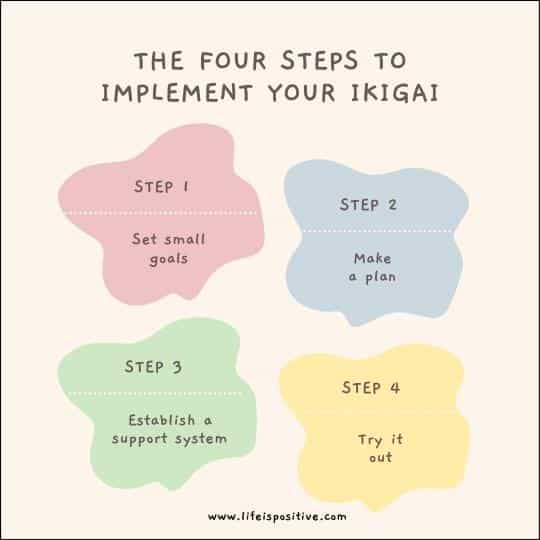
One of the notable aspects of Ikigai is its adaptability.
The authors recognize that the pursuit of one’s purpose is not a one-size-fits-all endeavor.
They acknowledge the dynamic nature of life, encouraging readers to continually reassess and redefine their Ikigai as they evolve.
This fluidity prevents the concept from becoming a rigid set of rules and, instead, positions it as a lifelong companion in the pursuit of happiness and fulfillment.
Read: Book Review: The Courage To Be Disliked
As the journey through Ikigai unfolds, readers are prompted to reflect not only on their professional lives but also on their relationships, personal development, and overall well-being.
The book introduces the concept of micro-ikigai, emphasizing the significance of finding small doses of joy and purpose in everyday activities.

This micro-level approach encourages individuals to infuse meaning into even the most mundane aspects of life.
By recognizing and cherishing these micro-ikigai moments, readers can cultivate a more profound sense of fulfillment in their daily existence.
The narrative of Ikigai also interweaves the importance of mindfulness and being present in each moment.
The authors advocate for the practice of being fully engaged in whatever one is doing, whether it’s savoring a meal, connecting with a loved one, or pursuing a personal interest.
Read: Habits To Change Your Life Forever
This mindfulness, when integrated into daily life, becomes a transformative force, enhancing the quality of experiences and deepening one’s connection with their Ikigai.
Moreover, the book acknowledges the role of community and social connections in the pursuit of Ikigai.
The authors emphasize the impact of meaningful relationships on overall well-being.
The sense of belonging and shared purpose within a community contributes significantly to an individual’s happiness and fulfillment.
Read: 12 Pain-to-Purpose Quote
Final Thoughts
LifeisPositive™ Rating ⭐️⭐️⭐️⭐️⭐️
As I close the final chapter of this literary odyssey, a sense of calm settles over me, much like the quiet satisfaction after a perfect cup of tea.
The journey through the pages of “ Ikigai ” has been more than just a reading experience; it’s been a companion in my quest for purpose and joy.
With each turned page, I’ve not only explored the cultural nuances of Ikigai but also unearthed the treasures hidden within myself.
The exercises, ranging from self-assessment questions to thought-provoking prompts, encouraged introspection and self-discovery in me.
By engaging with these activities, I embarked on a personal journey to unveil my passions, talents, mission, and vocation—the four pillars of Ikigai.
Read: 5 Books On Positive Thinking
The authors, likewise mentors, have illuminated the path to my own sweet spot, that magical intersection where passion and purpose dance hand in hand.
Whether you’re navigating the crossroads of your career, relationships, or personal growth, this book offers a compass to guide you toward your Ikigai—a life filled with purpose, passion, and lasting happiness.
As the book gently slips from my hands, I can’t help but feel a renewed sense of clarity and purpose.
The landscapes of Okinawa may fade from my mind, but the wisdom imparted remains, a quiet guide in the hustle of everyday life.
So, dear reader, take a moment to savor the book’s closing lines, for within them lies not just the end of a book but the beginning of a new chapter in your own Ikigai-inspired journey.
May your days be filled with meaning, joy, and the delightful pursuit of your passions.
Until the next adventure beckons, remember: your Ikigai is not just a destination but a lifelong exploration.
Cheers to the journey!
For more empowering content, connect with our vibrant community here ➡️ Social Media .
Latest Posts
How to become mature emotionally: 6 tips to transform your life, 5 powerful poems of encouragement that will inspire you, how to deal with feeling overwhelmed: 8 tips to regain control.
RELATED ARTICLES
How to escape 9-to-5: discover the 4-hour workweek secret, 20 best books for 5 and 6-year-olds that will inspire, did these 5 books really predict the future find out now, 10 easy books for people who don’t like reading, 6 best psychology books on human behavior you’ll love, how to deal with someone with a victim mentality, be the first to know.
Get weekly tips, success stories, deals and health hacks straight to your inbox.
The Mission Has Always Been And Continues To Focus On Uplifting The Planet.
- Privacy Policy
- DMCA Policy
- Cookies Policy
- Terms Of Service
This One Tiny Thing Can Revolutionize Your Day and Life
Could being a messy person actually be a strength, 10 foods you must eat before making a big decision, subscribe to our newsletter.
Subscribe Now for Uplifting Content and More!
© 2024 LifeisPositive™ All Rights Reserved.
Book review: Ikigai, the Japanese secret for a long and happy life

After reading the book ”Blue Zones” by Dann Buetner I learned two things: ”Ikigai” and ”Hara hachi bu” (later more on later). These are very interesting terms when it comes to a long and healthy life. Don’t we all want to live a long, healthy and happy life? Frances Miralles and Héctor García did research on the secret of the elderly in Japan. Why do Japanese elderly become so extremely old in certain areas in Japan? What are they eating? What are they doing to stay active? How do they deal with stress? What does their social life look like? All of this is discussed in ‘ ‘Ikigai, the Japanese secret for a long and happy life”.
This post contains affiliate links. Read my full disclosure here .
” Only those who remain busy want to become hundred ” – Japanese p roverb
What is ”Ikigai”?
The term ”ikigai” is explained in various ways. You can describe it briefly as: the reason why you get out of bed in the morning. It is the reason for your existence. The French might say ” raison d’etre” . The book also links to certain Western therapies (such as logotherapy) and may also be a question, such as: ”why don’t you commit suicide?” That’s a harsh question, but it’s forces you to really think what’s important in life. And right there lies the secret to a long and happy life. In the answer to this question you will find your own ikigai. This is one of the reasons why the inhabitants on the Okinawa island are getting so extremely old. On this Japanese island, there are more centenarians than anywhere else in the world. Not only are they old, but they are still active and happy, up until a very high age.
”We find our ikigai by concentrating on what is important , rather than what’s urgent . By constantly keeping an eye on what feels good, we are able to discover what our passion is.”- Mundo Urano
In this book, the term ikigai is translated as the bliss of always being busy. Ikigai is actually a combination of your passion, your mission and your profession. Your ikigai can be very clear, but also something you’re still looking for (which on its own may be your ikigai).
The elderly of Okinawa never retire. The best thing about your ikiga is that once you’ve found it, you don’t want to retire. Some 90 year olds say they have so many plans and don’t think about dying. They always keep having a purpose for which they get out of bed in the morning.
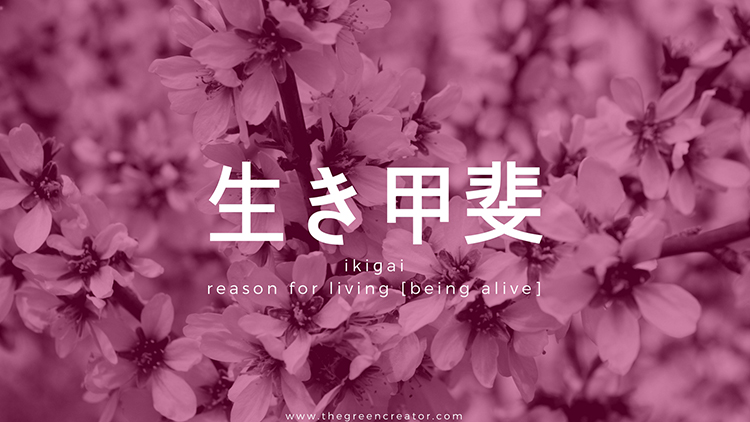
Hara hachi bu & Moai
An old Japanese proverb is: hara hachi bu. This means ”eat until you’re eighty percent full”. The Japanese elderly don’t overeat and believe that eating a little less than you need is healthier.
Another beautiful phrase is ”moai”. This represents a group of joined people with the same interests. In this group the elderly are always there for each other when they need help or support. Whether you have financial problems or need help with something at home, you can always count on your moai.
Good advice
What I appreciated in the book were the advices that were given (especially in the beginning and at the end of the book). The conversations with the elderly were also interesting and could have been, in my opinion, a bit longer and more comprehensive. Some good advices:
- Realize that the only thing that really exists and what we can control is the present. So we should not worry about the past or the future, but appreciate the things that are here right now. Keep in mind that things/persons are not here forever with us, but not in a way that will make you worry about it. The realization that everything/everyone is temporary with us should actually lead to a greater appreciation for life.
- Keep resilient. Resilience is the ability to get through a setback and to overcome it positively. You can do this for example by living in the moment, in Japanese this is called: wabi-sabi. This means that you should try to see the beauty of everything that is perishable, changing and imperfect.
“The things we love are like leaves on a tree, they can fall anytime when the wind pops up.” – Emperor Marcus Aurelius
How to age healthily?
On the island of Okinawa in Japan, most centenarians live per 100,000 inhabitants. In this book, they share their pieces of advice on how to stay and get old healthily.
- Limit stress consciously: Stress has a negative impact on our health. The writers share some tips on how to better manage stress. Meditation is an example to reduce stress, but also living consciously in the moment during small daily tasks can help.
- Stay physically active: The writers explain that a sitting existence is the ”enemy of staying young”. They share a few tips to move more on a daily basis. Walk to work or walk for fun for at least twenty minutes a day. Don’t use an elevator or escalator, but use your legs. The writers say: moderately intensive moving your body equals a longer life.
- Sufficient rest and sleep is important.
- Nutrition: A healthy diet is of course very important. The diet on Okinawa is also called the ”wonder diet”. It’s for example important to eat a variety of foods and not to overeat. The centenarians eat hardly any sugar. Often only 1x per week and then they choose cane sugar. They eat a lot of tofu and sweet potatoes and about 300 grams of vegetables per day. They eat a variety of foods and mostly plant-based. They also eat grains on a daily basis and eat small portions of everything several times a day.
- Strong social ties with family/friends/neighbors is important. On Okinawa, the moai groups were created to provide a social network. The elderly in these groups spend a lot of time together by meeting regularly and supporting each other in difficult times.
- Stay mentally strong: It’s important to keep using your brains. This can be done by brain training or by looking for new situations.
- Go out in the nature, smile and be grateful.

What could have been better
What I found a missed opportunity was the fact that the writers didn’t include a resource list in the book with references. Many of their statements can be backed up with books and studies. I think the addition of sources would have made their message even stronger.
Also, it was sometimes difficult to determine whether the book was about how to get old healthily instead of finding your ikigai. I have no problem with the topic ”healthy aging” (it’s my favorite topic), but I can imagine that readers may wonder sometimes: is this a book about finding your inner happiness or about healthy aging? I will explain this with an example. The book contains a great number of pages with explanations and illustrations on how to do certain exercises (such as the sun salutation, qi gong and tai chi). As this is a thin book already, I found this to be a bit unnecessary and too far away from the subject: ikigai/ finding your life purpose.
”All is good” – Jeanne Calment (122 years)
My conclusion is that this book is a nice, entertaining book that reads very easily and quickly and can certainly motivate you to live healthier. I’ve learned some nice tips. However, if you want to read more about the topic of centenarians and if you’re interested in their lifestyle, I can recommend the book ”Blue zone”.
I wouldn’t go so far by saying that this book will help you to find your own ikigai. This is something very personal and this can be something very big or something very small. This book is not really about that. However, it gives you an idea of how it feels once you’ve found it and explains why it’s so healthy. I can also recommend this book if you’re looking for great insights and inspiration to live healthier and more positive. There might have been some more ”ikigai tips” in this book, but nevertheless this book is a great addition if you love self-help books with an emphasis on health.
M icroflows & my ikigai
Ikigai is doing something where your heart is and that will get you into a flow. Ikigai can also be a microflow, where you enjoy daily routine tasks like doing the dishes. For this reason, Bill Gates for example does his dishes every night. It helps him to relax and he tries to do it better every day. In a better order for example by rules that he made up himself. Your ikigai does not have to be a big mission to change the world, but something you like, what you do everyday and what gets you into a flow.
My ikigai is without a doubt cooking, writing and photography. If I do this and the doorbell rings I need 5 seconds to get back on earth again. I completely forget about time and sometimes even where I am. I totally get into my flow. That’s clearly my ikigai and I’m grateful that I’ve found it.
And what about you? Are you still looking or have you found your ikigai?
” Ikigai, the Japanese secret for a long and happy life”. $ 11.75 Publisher : Penguin Books (August 29, 2017)
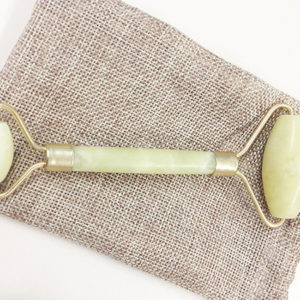
The jade roller

My Experience With An Ice Face Roller

8 Healthy Things I Learned in Thailand
Stay up to date and get more recipes and updates delivered to your inbox, follow me on.


LOCHANREADS
The diverse book reviews and recommendations site
Ikigai: The Japanese Secret to a Long and Healthy Life | Book Review

Written by the Spanish health and lifestyle authors; Hector Garcia and Francesc Miralles, one of their many books on Japanese culture, Ikigai is a self-improvement book about finding meaning in life and how having a sense of purpose contributes to longevity.
Ikigai is a beautifully nuanced concept, rooted in Japanese culture and can be translated as “the happiness of always being busy” according to the authors. It’s a unique and perhaps elusive expression for many Westerners in that there’s no exact English translation, much like with another Japanese term; wabi-sabi ; ‘the beauty of age and imperfection,’ which is also the title of a fiction novel authored by Francesc Miralles. These expressions are hard to translate accurately because of how they exist at the center of Japanese customs and ways of living. It is through these singularly Japanese ways that the authors depict the concept of ikigai for its Western readers.
This is an effortlessly influential read, written in a simplistic, easily laid out format, that I completed in a day. I was impressed by how effectively it uses few words to discuss the importance of finding one’s purpose and how doing so can result in a long life, as it does for the many inhabitants of Okinawa Island, a prefecture belonging to Japan and one of the world’s five Blue Zones i.e. places where the healthiest people on earth live the longest.
The book sometimes deviates into explaining Western philosophies, such as Viktor Frankl’s logotherapy and Mihaly Csikszentmihalyi’s concept of ‘flow’. It was super intriguing and impactful stuff and I could definitely see the connections to the ethos of ikigai . Whilst reading about the works of these thinkers, I couldn’t shake the feeling that the book could’ve used more examples of Eastern philosophers to explain the meaning of ikigai , seeing as they would be able to impart unparalleled insight because it lies at the heart of their culture. But retrospectively, I think that the weaving in of minds like Frankl and Csikszentmihalyi did help to make the concept of ikigai more understandable in a Western context.

Unfortunately, inasmuch as I loved the broad-brush nature of the writing, it didn’t always feel cohesive to me. It encourages the reader to find meaning in the things there’re passionate about and to continue working hard at them, well past retirement age. But at the same time, it felt like I was reading a book on how to live a healthier life and thus increase your chances of making it to 100 years of age. The takeaway? Remaining active and always doing the things you love, even in old age is the secret to a long and happy life. However, I would’ve loved it if the writers bridged the gap between these two objectives a bit more.
There’s also a really interesting diagram that appears at the very beginning of the book and on the back cover; a Venn diagram that illustrates the concept of ikigai . I was hoping for more of an analysis of that diagram and how the different components interact to define your mission, your passion, your vocation and your profession. Who developed that Venn diagram, anway? Was it the authors or some Japanese thinker inspired by John Venn? The book doesn’t say.
That aside, there’s much to take away from this small but motivating guide. Reading it will definitely change your outlook and get you moving as you attempt a yoga pose for the very first time, all whilst holding the book!
You Might Also Like:

- Already have a WordPress.com account? Log in now.
- Subscribe Subscribed
- Copy shortlink
- Report this content
- View post in Reader
- Manage subscriptions
- Collapse this bar

Ikigai Summary of Key Ideas and Review | Héctor García and Frances Miralles
The japanese secret to a long and happy life.
Life gets busy. Has Ikigai been sitting on your reading list? Learn its 10 rules now.
We’re scratching the surface in this Ikigai summary. If you don’t already have the book, order it here or get the audiobook for free on Amazon to learn the juicy details.
Disclaimer: This is an unofficial summary and analysis.
Introduction and Ikigai Meaning
Why is Okinawa referred to as the island of (almost) eternal youth? Why is it home to so many centenarians?
Ikigai is at the heart of Okinawan culture and is one key to its health and prosperity. Okinawa is an island to the south of mainland Japan, containing some of the world’s longest-living humans. On average, men live up to 84 years and women until 90. Héctor García and Francesc Miralles, lived among Okinawans and gained a first-hand account of why these people are healthier, happier and live longer than anywhere else in the world.
Researchers have identified that their diet, simple outdoor lifestyles, and subtropical climate are three reasons for their longevity. However, it is Ikigai that shapes their lives.
Iki means “to live,” and gai means “reason.” Therefore, Ikigai is a reason to live. Each individual’s ikigai is personal to them and specific to their lives, values, and beliefs. It reflects the inner self and creates a mental state in which the individual feels at ease.
About Héctor García and Francesc Miralles
Héctor García is a Japanese-Spanish author who has written several books about Japanese culture, including two worldwide bestsellers, A Geek in Japan and Ikigai. A former software engineer, Héctor worked at CERN in Switzerland before moving to Japan. He has now lived in Tokyo for over 16 years.
Francesc Miralles is a Catalan international award-winning author of self-help and inspirational books. His bestselling novel Love in Lowercase has been translated into twenty languages. Miralles too lived in Okinawa, Japan.
It was while living in Okinawa that Hector Garcia and Francesc Miralles had the opportunity to interview more than a hundred villagers about their philosophy for a long and happy life.
Here are the 10 rules of Ikigai:
StoryShot #1: Find and Follow Your Ikigai
The Japanese word ikigai is a difficult word to translate. It roughly means “a reason for being” and is often translated as “a reason to live”.
In Okinawa, people view ikigai as the ‘why’ behind their daily life. It is important for them to find their ikigai, and they understand that doing so will bring them happiness and fulfillment.
Ikigai is the philosophy that blissfully gives them purpose until the end of their days.
In contrast, other cultures follow a path that society has created for them. We live by someone else’s standards and set aside our own desires. Because of this, we rarely find our purpose and passions in life.
As we all know, happiness relies on much more than just having a career and getting a paycheck. Likewise, only doing things we love or doing things we are good at is not enough to sustain us financially. Hence, one’s ikigai lies at the center of four interconnecting circles. Each of these elements helps contribute to our happiness; all four are crucial to our “reason for being.”
To help you live more mindfully and find your ikigai, ask yourself these four questions:
- What do I love?
- What am I good at?
- What does the world need from me?
- What can I get paid for?
Finding and embracing your ikigai is one of the first steps to a long, happy life. Without it, you’ll wander through life, holding on to material objects, memories from the past, or other people. You’ll jump from one goal to another, from one daily task to the next.
StoryShot #2: Take it Slow
Okinawa is known for its slow-paced way of life. The people here are passionate about everything they do, however insignificant it might seem. They strive to do their best in anything they do.
This is because they have an ikigai. But while this is the case, they don’t feel pressured by it and enjoy all that they do. They celebrate the time they have, even the little joys in life. Subsequently, music and dance are essential parts of daily living.
Ikigai helps Okinawa residents be more mindful in their daily lives. The concept of ikigai has its roots in Zen Buddhism, which emphasizes the importance of living in the present moment and keeping an open mind.
For most of us, it’s easy to get caught up in the hustle and bustle of everyday life and forget to slow down and be mindful. Technology has helped us save time, but we use our spare time to do other tasks instead of rest.
A slower-paced life means taking time to enjoy your mornings, instead of rushing to work in a frenzy. It means taking time to enjoy whatever you’re doing, to appreciate the outdoors, and to focus on whomever you’re talking to.
Slowing down is a conscious decision and not always an easy one. However, it leads to a greater appreciation for life and greater happiness.
StoryShot #3: Don’t Fill Your Stomach
The okinawan diet.
Okinawa is home to the largest population of centenarians—people who have lived to the age of 100 or more. Okinawa has the highest concentration of centenarians in the world, with over 14 per 10,000 people.
So, what’s the secret to their longevity? One factor may be their diet.
The “Okinawa diet” includes at least five servings of fruits and vegetables each day, with small amounts of fish and lean meat. Typical items include tofu, miso, bitter melon, seaweed, soy sprouts, peppers, and green tea. They rarely eat sugar, and, if they do, it’s cane sugar. The average daily intake of an Okinawan is about 1,900 calories. This is significantly less than the average number of calories consumed by a typical American. They also eat almost half as much salt as the rest of Japan: 7 grams per day, compared to an average of 12.
Hara Hachi Bu
Okinawans also practice a Confucian teaching called Hara Hachi Bu. Hara Hachi Bu is a traditional Okinawan saying that means “eat until you are 80 percent full.” The idea is that you should stop eating when you are no longer feeling hungry, rather than continue to eat until you feel stuffed.
This philosophy of eating is based on the belief that it is better to stop eating before you feel too full, as it can lead to indigestion and other health problems. It also supports Okinawans with the highest percentage of centenarians in the world.
Ways to get started include:
- Eat slowly – Eating faster results in eating more. If we slow down, we will be mindful and allow our body to respond to cues, telling us we are no longer hungry.
- Focus on food – If you’re going to eat, just eat. This way, you’ll eat more slowly, consume less, and savor the food more.
- Use small vessels – If you choose to eat on smaller plates and use tall, narrow glasses, your brain believes it’s had more portions. You’re likely to eat significantly less without even thinking about it. Don’t believe me? Look at the size of your plate next time you’re at an all-you-can-eat buffet. You’ll see they’re a lot smaller than the ones in your kitchen cabinet.
StoryShot #4: Surround Yourself With Good Friends
Friendship is a close relationship between two people. It’s based on mutual trust and respect. It’s different from other relationships because it’s voluntary, and it’s built on shared experiences and common interests.
In small neighborhoods across Okinawa, the concept of friendship is deep and close. Okinawa is a small island, so people here know each other well. So, there is a strong sense of community and connectedness.
Okinawans believe true friends are those who stick by you through thick and thin. These close relationships provide support and stability during good times and bad.
As a result, Okinawans place a lot of value on maintaining strong relationships with their friends. This is reflected in the way they interact every day. For example, Okinawans often take the time to catch up with their friends over a cup of tea or coffee, and they are always willing to lend a listening ear. They also often go out of their way to help their friends, even if they are not asked to do so. This willingness to help others is one of the many things that make Okinawan culture so special.
And they do this for their community, called Moai. The term originated hundreds of years ago and traditionally meant a social support group for a village.
Originally, Moais were formed to pool the resources of an entire village for projects or public works. Today, the idea has expanded to become more of a social support network, a cultural tradition for built-in companionship. Traditionally, five young children were grouped together and committed to living as a Moai. As their second family, they regularly met with their Moai for work, play, and pool resources. Some Moais have lasted over 90 years.
Research shows that friends can affect your health even more than family. People with the most friends tend to outlive those with the fewest by 22 percent. Keep in mind that this means real friends. The authors point out that Facebook friends and Twitter followers do not count.
The key isn’t to try to have several friends. Superficial and distant relationships will only lead to feelings of insecurity and loneliness. These emotions increase your risk of illness and death, as much as obesity, alcoholism, and smoking. The key is to have three or four good friends that care for you the same way you care for them. The easiest way to develop close friendships is to think about what you can do to help the people closest to you be happier.
StoryShot #5: Smile
Being from Okinawa brings its challenges. The island is small and remote, which can sometimes make it difficult to access essential goods and services. And yet, the people of Okinawa are some of the most cheerful people you’ll ever meet.
Okinawans believe it’s wise to recognize the things that aren’t so great. For them, smiling is a way to stay positive and motivated. It’s also a way to show strength in the face of adversity.
One of the secrets of their long life is smiling and having a good time. This cheerful attitude is not only relaxing, but also helps them make new friends. There are no bars and only a few restaurants in Ogimi, a small village on the northern side of Okinawa. However, those who live in Ogimi enjoy a rich social life that revolves around community centers.
Smiling does more than tell other people you’re happy. Smiling lowers your heart rate and reduces blood pressure, while relaxing your body. A study from University College London found that cheerful people are 35 percent more likely to live longer.
We rate Ikigai 4.5/5. How would you rate Héctor García and Frances Miralles’s book based on this summary?
Editor’s Note
This article was first published in 2020. It was updated in July 2022.
Ikigai PDF, Free Audiobook, Infographic and Animated Book Summary
Comment below and let others know what you have learned or if you have any other thoughts.
New to StoryShots? Get the PDF, infographic, audio and animated versions of this summary of Ikigai and hundreds of other bestselling nonfiction books in our free top-ranking app. It’s been featured by Apple, The Guardian, The UN, and Google as one of the world’s best reading and learning apps.
To dive into the details of Ikigai, order the book or get the audiobook for free .
Related Book Summaries
- Man’s Search for Meaning by Viktor Frankl
- Flow by Mihaly Csikszentmihalyi
- Deep Work by Cal Newport
- The Happiness Project by Gretchen Rubin
- Antifragile by Nassim Taleb
- Start With Why by Simon Sinek
- Lifespan by David Sinclair
- The 4-Hour Workweek by Tim Ferriss
- Tao Te Ching by Lao Tzu
- The Power of Now by Eckhart Tolle
- The Life-Changing Magic of Tidying Up by Marie Kondo
- Feeling Good by David Burns
- Essentialism by Greg McKeown
- The Power of Habit by Charles Duhigg

What is Ikigai?
Ikigai is a Japanese concept that means a reason for being. It represents the intersection of what you love, what you are good at, what the world needs, and what you can be paid for.
How can Ikigai improve my life?
Discovering your Ikigai can lead to greater fulfillment and happiness, guiding you to pursue passions that align with your skills and values.
What is the Ikigai book?
The Ikigai book, often referred to as Ikigai: The Japanese Secret to a Long and Happy Life, explores the principles of Ikigai and how they contribute to longevity and satisfaction.
What are the main takeaways from the Ikigai book summary?
The Ikigai book summary highlights key ideas such as the importance of community, staying active, and pursuing meaningful work to achieve a long, happy life.
How do I find my Ikigai?
To find your Ikigai, reflect on your passions, strengths, values, and the needs of the world. A Venn diagram can help visualize the overlaps.
Can Ikigai be applied in the workplace?
Yes, applying the principles of Ikigai in the workplace can enhance job satisfaction, boost creativity, and foster a more engaged work environment.
What role does community play in Ikigai?
Community is vital in Ikigai, as strong social connections contribute to happiness and a sense of belonging, enriching your life purpose.
Is there a difference between Ikigai and finding a career?
Yes, Ikigai encompasses more than just a career; it includes hobbies, relationships, and personal growth, all contributing to a holistic sense of purpose.
Share to show you care
Similar Posts

Emotional Intelligence 2.0 Summary | Travis Bradberry and Jean Greaves
Life gets busy. Has Emotional Intelligence 2.0 been gathering dust on your bookshelf? Instead, pick up the key ideas now. We’re scratching the surface here. If you don’t already have the book, order it here or get the audiobook for free on Amazon to learn the juicy details. This book provides a definition and framework for thinking about emotional intelligence, a…

Do The Work Summary Review and Quotes | Steven Pressfield
Overcome Resistance and Get Out of Your Own Way Life gets busy. Has Do The Work been on your reading list? Learn how to overcome Resistance and unlock your creativity with this book summary. We’re scratching the surface here. If you don’t already have this bestselling book by Steven Pressfield, order it here or get…

Sex Before Coffee Summary
Introduction Sex Before Coffee: A Guide to Dating in Scandinavia is a book by Marina Iakovleva, a dating coach and YouTuber who specializes in helping people date across cultures. In the book, Iakovleva shares her own experiences dating Scandinavians, as well as insights from interviews with a variety of Scandinavian people. She covers everything from…

Where Good Ideas Come From Summary | Steven Johnson
“Where Good Ideas Come From” is a book by Steven Johnson that explores the sources of innovative and creative ideas. Johnson argues that good ideas often come from the “adjacent possible,” which he defines as the space of all the ideas that are one small step away from our current understanding. He also argues that…

What You Do is Who You Are Summary Review | Ben Horowitz
How to Create Your Business Culture Life gets busy. Has What You Do Is Who You Are been gathering dust on your bookshelf? Instead, pick up the key ideas now. We’re scratching the surface here. If you don’t already have the book, order the book or get the audiobook for free on Amazon to learn the juicy details….

How to Think More About Sex Summary Review | Alain de Botton
How To Think More About Sex by Alain de Botton, argues that 21st-century sex is ultimately a balancing act between love and desire, adventure and commitment. – De Botton is a philosopher, and he draws on the insights of pop philosophers like Nietzsche and Freud to make his points. He also received questions from readers…

12 Comments
Wow, very interesting ideas for life. Thanks forbthe author and also this amazing apps for the good review
Thanks for the comment and using StoryShots!
Fantastic! Really from this story shot i have gained too much knowledge to live a purposeful and meaningful life.
We’re glad to know that! And thanks for your heart-warming comment.
Simply Awesome ! Appreciate all the hard work that has gone in to making of this book for people to read it under one cover. Thanks to them traveling across continents and reaching the remotest of the mountains to put it all on record. Truly introspective book!
We couldn’t agree more. Thanks for your comment, Prajakta!
- Pingback: IKIGAI book summary – Digital Library of Vishal Thakur
Really enjoyed this short summary.. perfect for my travel to work!
We’re happy you like it. Thanks for your comment and letting us know!
Perfect for my travel Thank you
We’re glad to read that, Ella!
Leave a Reply Cancel reply
Your email address will not be published. Required fields are marked *
Save my name, email, and website in this browser for the next time I comment.
This site uses Akismet to reduce spam. Learn how your comment data is processed .
- 21 WhatsApp
- 59 Facebook

Hi, what are you looking for?

Where Speed Meets City Vibes: A Guide To Experiencing Singapore Beyond The GPSS This September!

A Weekend of Holistic Wellness and Financial Empowerment

Preparing for a Healthy and Safe Academic Year: Comprehensive Guidelines for Educational Institutions

Speech by Alhasan Aldabbagh, President of Asia-Pacific Markets at the Saudi Tourism Authority @ IOI City Mall, Putrajaya for the Saudi Travel Fair

Hong Leong Islamic Bank & SEDANIA As Salam Capital Offer Digital Hibah Financing
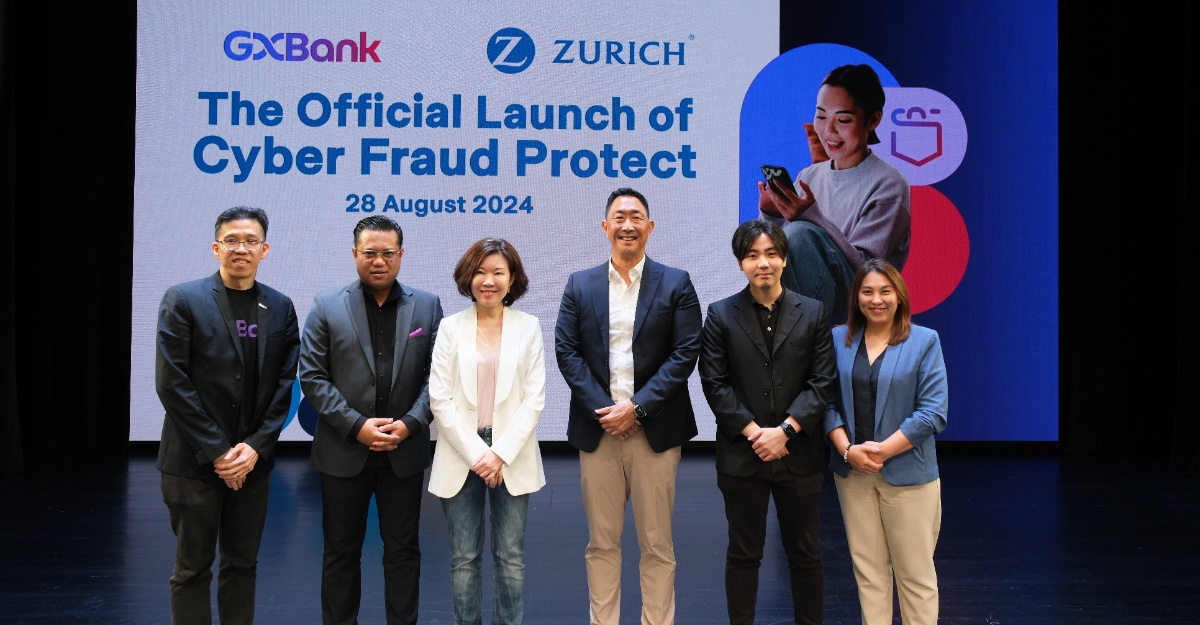
Zurich Malaysia Collaborates With GXBank To Launch Cyber Protect Digital Insurance Product
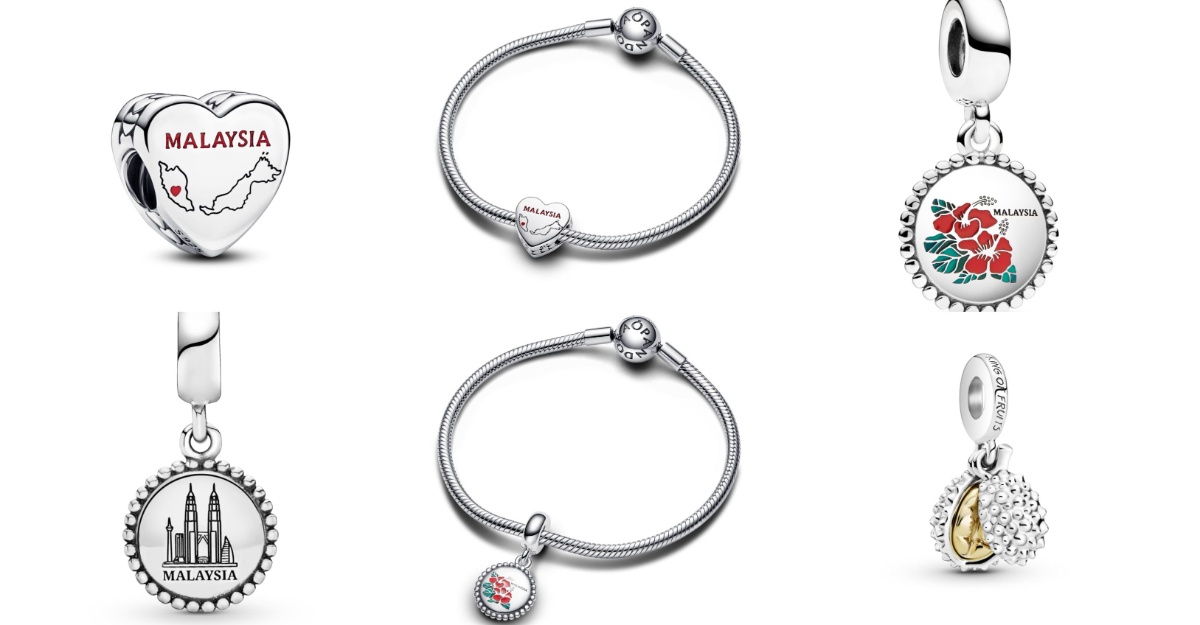
CHARMS OF MALAYSIA: Celebrate Merdeka with Pandora’s Charms of Malaysia

Saudi Tourism Authority Invites Malaysian Travellers to Explore Beyond Spiritual Travel

Celebrate Merdeka with redBus: Explore 67 Vibrant Bus Routes and Win Big!

Win Big At The Saudi Travel Fair To Celebrate The 67th Malaysian Independence Day

The Body Shop Celebrates 40 Years in Malaysia with Changemaking Campus

Meet The Ordinary’s Body Care
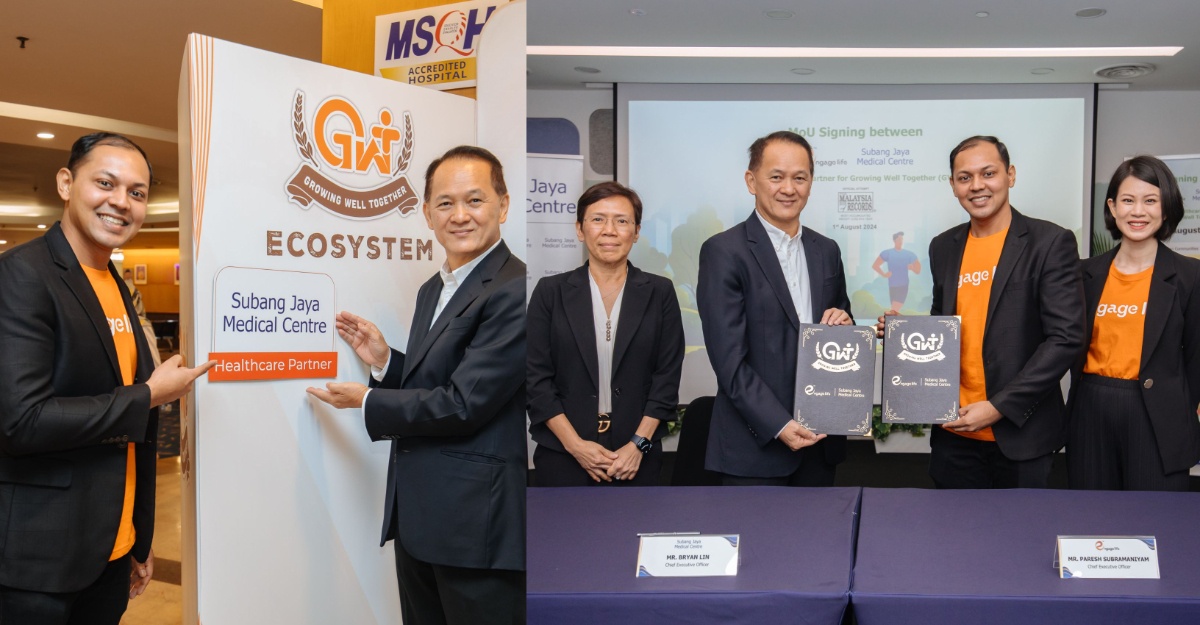
Engage Life and SJMC Joins Forces to Combat Obesity and Diabetes

Breaking the Barriers of Ageing: Malaysia’s First Biological Age Testing Collaboration

Malaysians Prioritize Effective Health Protection for Long-term Well- being, According to Manulife’s Asia Care Survey
Book Review: ‘Ikigai’ And Here Are Reasons Why You Should Read It!
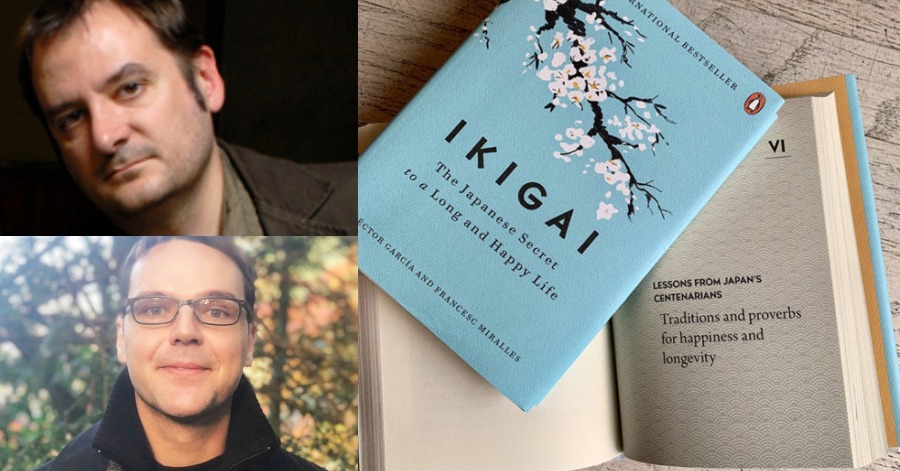
Many of us tend to believe that if we earn a lot or if we owned something, we’ll be happier. Our minds are always so focused on materialistic things. I’m not saying that’s wrong but there’s more to happiness than just wealth, success, or possession.
From many views of culture, there is one belief that stands out. Ikigai (pronounced ee-key-guy) is a lovely Japanese idea that roughly translates to “cause for being.” It’s a combination of two Japanese words: iki , which means “life,” and kai , which means “impact, result, merit, or profit.” “A purpose to live,” says the combination.
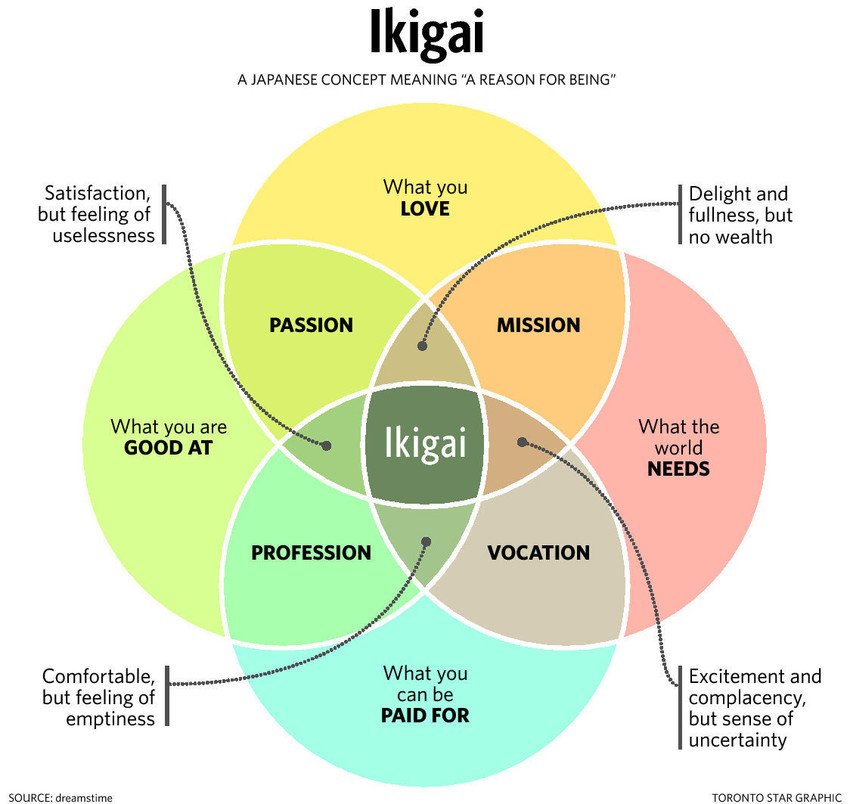
Picture: QAspire
Speaking of Ikigai , here’s one book I came across and it’s worth the read. Ikigai: The Japanese Secret to a Long and Happy Life is a moving and well-researched story of the inspiring lives of Japanese supercentenarians (those who have lived over the age of 110) from Okinawa, the world’s longest-living society.
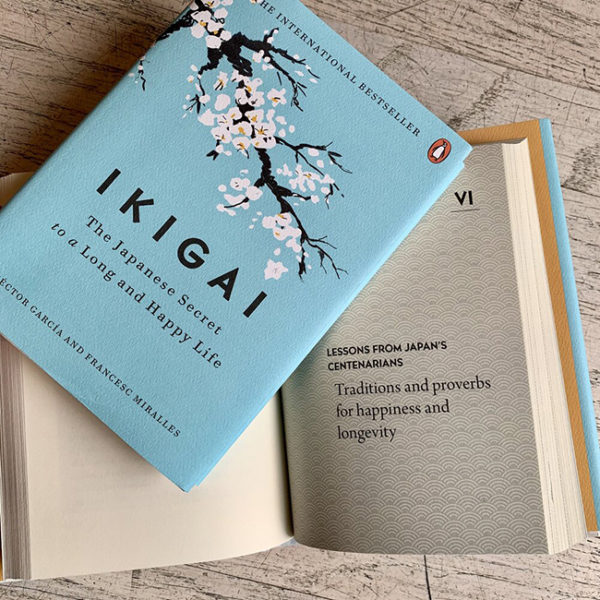
Picture: Plum
The book takes you through Okinawan lives, mindsets, attitudes, diets, and routines, chapter by chapter, urging you to find your own ikigai . Although this is an interpretation, as the term literally means lifetime and everyday life in Japanese, it might be interpreted as one’s reason for being.
Ikigai: The Japanese Secret to a Long and Happy Life is written by Hector Garcia and Francesc Miralles.
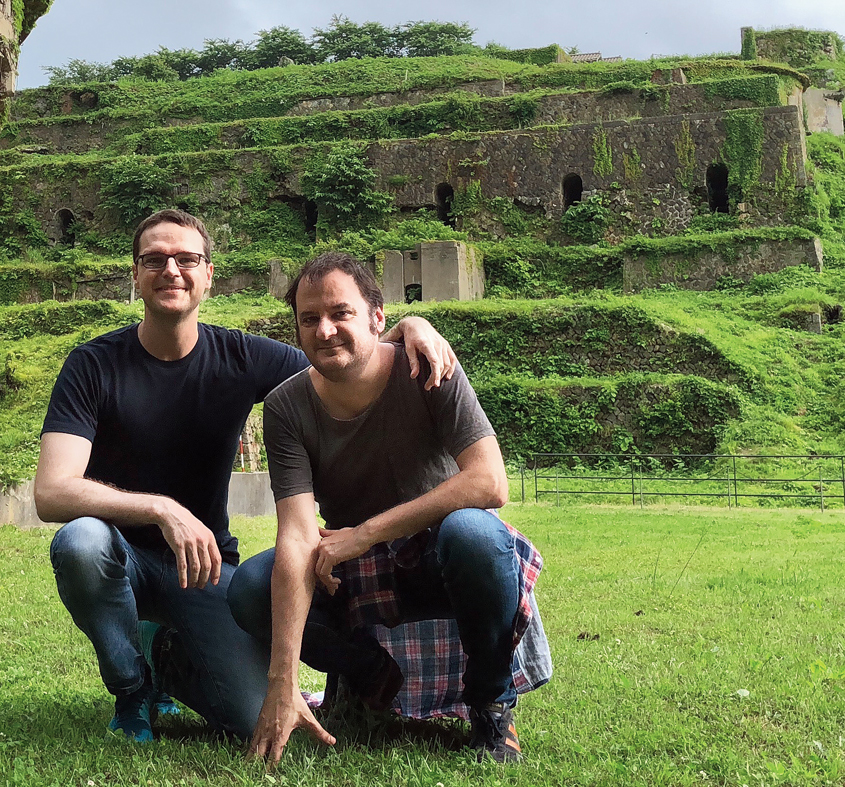
Picture: Telegraph India
Hector Gracia, a Spaniard by birth, is a writer and aspiring philosopher. He has lived in Japan for the past 18 years. Before relocating to Japan, he worked as a software engineer in Switzerland. Ikigai, A Geek in Japan, and Ichigo Ichie are two of his most well-known works.
Francesc Miralles, an award-winning author of fiction, self-help, and inspirational books, was born in Spain as well. He majored in journalism and minored in English literature and German. He’s worked as an editor, translator, ghostwriter, and musician, among other things. His books Ikigai and Love in Lowercase are well-known.
Not convinced yet, here’s 5 reason why you should be reading this book.
1. It gives you a sense of purpose
Finding one’s most immediate purpose at the time is one of the first tasks Miralles and Garcia encourage their readers to do. It could be something as huge as getting a better job or trying to buy a house, or something as simple as mastering a new recipe or passing an exam. Our goals, no matter how big or small, motivate us to keep going, and we often overlook the simpler ones.
However, for our physical and emotional well-being, rising up earlier or studying more is just as essential as long-term ambitions like starting a business. When the book urged me to take a moment to become conscious of my most modest aims, I felt as though even my smallest activities were contributing to my ultimate goal of living a longer, happier life.
2. Encourage reflection
We often miss witnessing some of the most crucial events in our life because we are rushed, preoccupied, and always busy. Although Ikigai does not instruct its readers to start expressing appreciation or writing down their accomplishments, it does encourage them to be mindful throughout.
The book urges you to think about your favorite pastimes, your happiest memories, the present moment, and what it looks like – because we rarely notice what is going on in the present because we are so preoccupied with worry about the future. Taking the time to reflect on where I was in life and how I’d arrived there was a watershed moment for me, especially in terms of my mental health, and it made everything seem more relevant.
3. Shows happiness lies in simplicity
The old Japanese population with whom the authors spent time conducting research for their book all live basic, plain lives that may appear dull or futile to our Western, social media-imposed standards. Living luxurious life or having great wealth and possession isn’t the only source of happiness. Happiness can always come from even the simplest form.
4. Intuition approach to health
Surprisingly, running till your lungs burn, calculating calories, and taking endless supplements are not part of the Okinawan way of life. They exercise, but rather than undergoing intensive training, they focus on moving their bodies. They are active, but through community service, dancing, and gardening, and they eat healthily, but not restrictively. This is one of the best Ikigai takeouts. It makes you want to do something, but only if your intuition tells you to.
5. Helps regain positivity
It is difficult to stay positive always. We have tonnes of problems surrounding us and all we do is end up whining or sulking about it. And sometimes, we just others that we are happy but fail to realize whether we are actually happy.
This book is responsible for my renewed optimism. As a result, I’m back to being myself. It motivates you, makes you feel at ease with yourself and your life, helps you let go of comparisons and unreasonable expectations, and helps you focus on your will to live and your peace of mind.
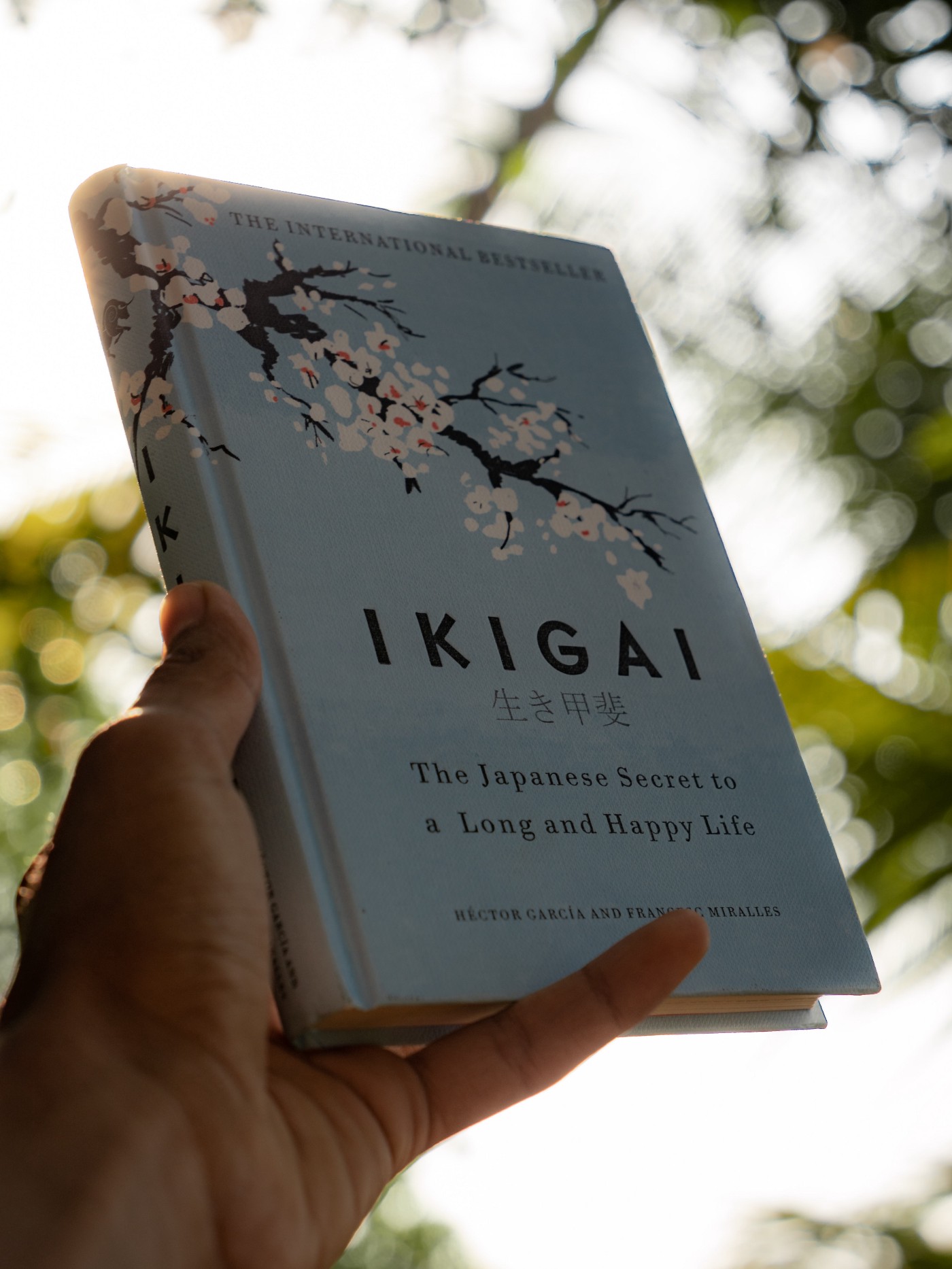
Picture: Books Are Our Superpower
This book will provide you the life-changing tools to uncover your personal ikigai . It is both inspiring and soothing. It will teach you how to let go of urgency, discover your purpose, build friendships, and pursue your hobbies.
Ikigai is very much recommended for those who are dissatisfied by their employment, stressed and busy at work and don’t have time to live their lives, or who don’t have a purpose in life and feel lost, or who are disheartened by failures. Not only that, This book can also help people who live unhealthy lifestyles, such as those who eat junk food, don’t exercise, drink and smoke, and so on. Ikigai can teach anyone the value of living a life with a purpose. Anyone who wishes to live a long, happy, and purposeful life should read this book.
Sources: Expords , Goodreads , Books Are Our Superpower
Share this:

Your email address will not be published. Required fields are marked *
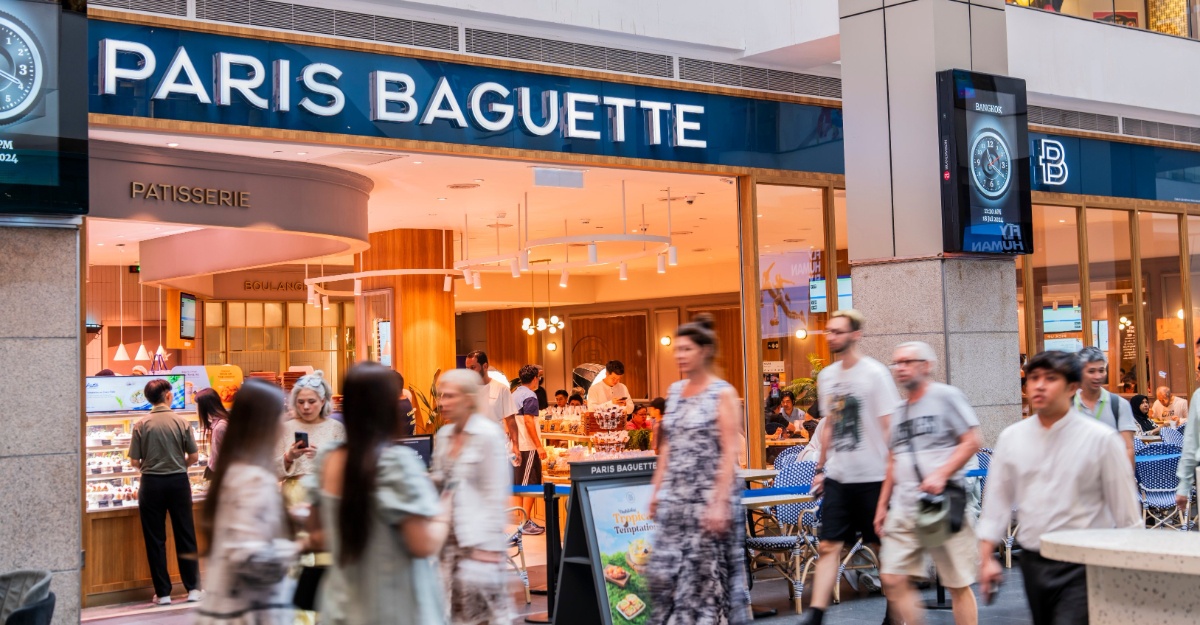
Paris Baguette Opens Its 6th Store In Malaysia At IOI City Mall

Malaysia Speed Festival Merdeka Race 2024 Powered By PETRONAS Primax

PALMEX Malaysia 2024 Opens with a Strong Focus on Innovation and Sustainability in the Palm Oil Industry

The Return Of The Crunch: KFC Malaysia Brings Back The Golden Butter Cereal In Celebration Of Merdeka

Chan Ai Cheng Makes History as First Second-Generation Woman to Win Prestigious Estate Agent of the Year Award
Like our facebook page.
You May Also Like
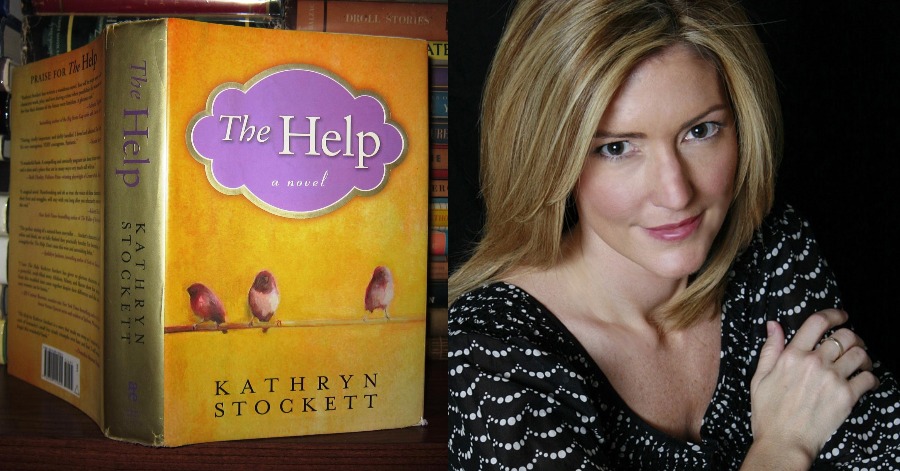
Book Review: ‘The Help’, A Book That Reveals The Truth!
The Help is a well-written storey with genuine characters that will break your heart and make you laugh at the same time. The hardcover...
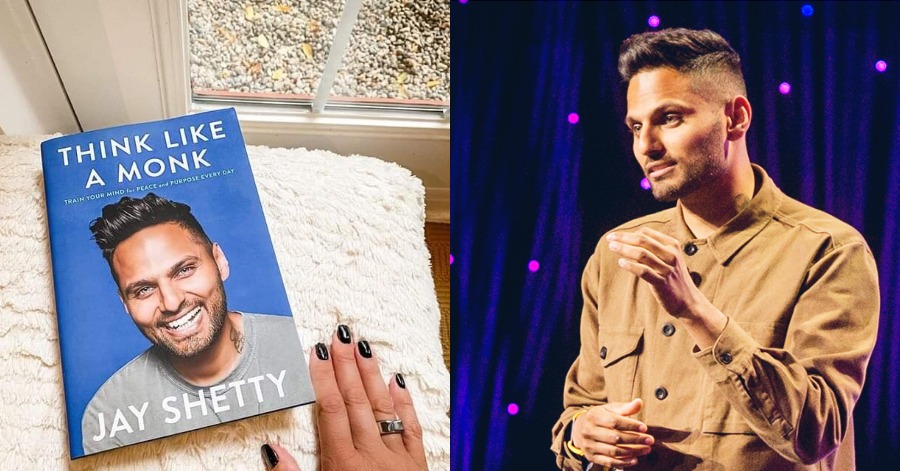
Book Review: Go On A Self-Love Journey With Jay Shetty’s ‘Think Like A Monk’
A combination of ancient wisdom and Jay Shetty’s personal experiences, ‘Think Like A Monk’ is a must possess book. This book is super inspiring...

Book Review: ‘Harry Potter And The Cursed Child’, A Book That You Must-Read!
When it comes to a series of magical events, nothing beats J.K.Rowling! Ever wonder why Harry Potter became so famous? J.K.Rowling’s and the movie...
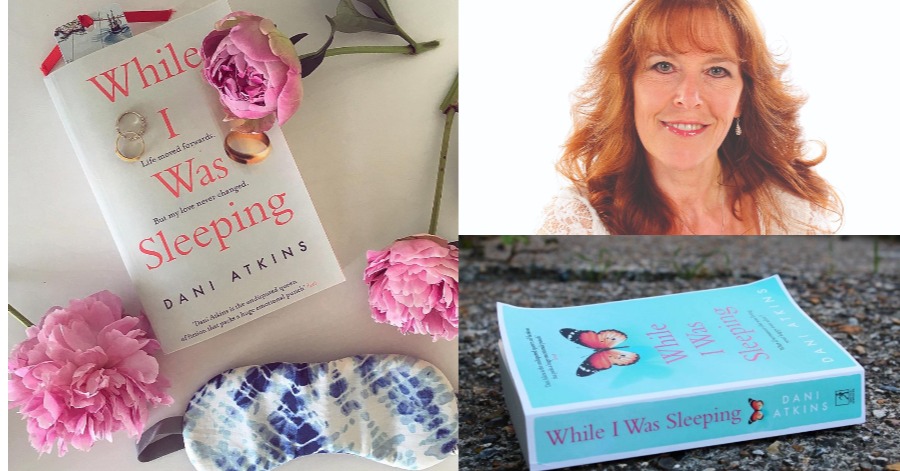
Book Review: An Emotional Rollercoaster, ‘While I Was Sleeping’ By Dani Atkins
‘While I Was Sleeping’ can be said as one of the most moving book stories and will stay in your thoughts long after finishing...
- Health, Fitness & Dieting

Sorry, there was a problem.

Download the free Kindle app and start reading Kindle books instantly on your smartphone, tablet, or computer - no Kindle device required .
Read instantly on your browser with Kindle for Web.
Using your mobile phone camera - scan the code below and download the Kindle app.

Image Unavailable

- To view this video download Flash Player

Follow the authors

Ikigai: The Japanese Secret to a Long and Happy Life Hardcover – August 29, 2017
- Print length 208 pages
- Language English
- Publisher Penguin Life
- Publication date August 29, 2017
- Dimensions 0.9 x 5 x 7.1 inches
- ISBN-10 0143130722
- ISBN-13 978-0143130727
- See all details
Customers who bought this item also bought

From the Publisher

Editorial Reviews
About the author, product details.
- Publisher : Penguin Life; Illustrated edition (August 29, 2017)
- Language : English
- Hardcover : 208 pages
- ISBN-10 : 0143130722
- ISBN-13 : 978-0143130727
- Item Weight : 9.6 ounces
- Dimensions : 0.9 x 5 x 7.1 inches
- #1 in Consciousness & Thought Philosophy
- #6 in Longevity
- #17 in Happiness Self-Help

Videos for this product

Click to play video

HONEST & Silly Ikigai book Review

Review of Ikigai The Japanese Secret to a Long Worth a read?
🌟Turner Family Reviews🌟

Must Watch Before You Buy

My Honest Review of Ikigai

Honest Review - Inspirational Ikigai Book
Jessica Ame

Easily A Favorite!
Nunn Reviews

Customer Review: Are you struggling to find purpose and meaning in your life?
Terri Hanson Mead
What is IKIGAI? - The Japanese Concept of Life Purpose!
Ray's Reviews

When you discover your ikigai, it is like an awakening.
Cary Decker

Ikigai: The Japanese Secret to a Long and Happy Life
Merchant Video
About the authors
Héctor garcía.
Héctor García was born in Spain and worked at CERN in Switzerland before moving to Japan, his home for 16 years and counting. In Tokyo, when he is not writing his next book, he makes a living in the IT industry. His popular blog led to his international bestseller A Geek In Japan. He is the author of the bestselling Ikigai: The Japanese Secret to a Long and Happy Life; translated to 57 languages, has the strange honor of being the most translated book ever originally written in Spanish language. To this day he has published seven books, his latest one is: The Book of Ichigo Ichie.
Heather Cleary
Heather Cleary’s translations include Betina González’s American Delirium, Roque Larraquy’s Comemadre (nominee, National Book Award 2018), and Sergio Chejfec’s The Dark (nominee, National Translation Award 2014) and The Planets (finalist, BTBA 2013). She has served as a judge for the National Book Award (Translated Literature), the BTBA, and the PEN Translation Award. A member of the Cedilla & Co. translation collective and a founding editor of the digital, bilingual Buenos Aires Review, she holds a PhD in Latin American and Iberian Cultures from Columbia University and teaches at Sarah Lawrence College.

Fracesc Miralles
Discover more of the author’s books, see similar authors, read author blogs and more

Francesc Miralles
Francesc Miralles is a lecturer and award-winning author of bestselling books in the areas of health and spirituality. Born in Barcelona, he studied journalism, English literature and German philology, and has worked as a translator, editor, art therapist and musician. His novel Love in Lowercase has been translated into 28 languages. Along with Hector Garcia, he is the author of the bestselling Ikigai: the Japanese Secret to a Long and Happy Life.
Customer reviews
- 5 star 4 star 3 star 2 star 1 star 5 star 69% 18% 8% 2% 1% 69%
- 5 star 4 star 3 star 2 star 1 star 4 star 69% 18% 8% 2% 1% 18%
- 5 star 4 star 3 star 2 star 1 star 3 star 69% 18% 8% 2% 1% 8%
- 5 star 4 star 3 star 2 star 1 star 2 star 69% 18% 8% 2% 1% 2%
- 5 star 4 star 3 star 2 star 1 star 1 star 69% 18% 8% 2% 1% 1%
Customer Reviews, including Product Star Ratings help customers to learn more about the product and decide whether it is the right product for them.
To calculate the overall star rating and percentage breakdown by star, we don’t use a simple average. Instead, our system considers things like how recent a review is and if the reviewer bought the item on Amazon. It also analyzed reviews to verify trustworthiness.
Customers say
Customers find the writing style quick, easy, and well presented. They also find the content insightful, helpful, and anti-aging. Opinions differ on the length, with some finding it short and gratifying, while others say it's too short.
AI-generated from the text of customer reviews
Customers find the book very insightful, informative, and helpful for adopting a purposeful and peaceful way of life. They also say the 10 steps are incredibly helpful and get their mind focused. Readers also appreciate the seamless blend of Japanese philosophy and modern research. They say the book is a wonderful introduction to ikigai and comprehensive.
"...This is a wonderful introduction to ikigai —finding your reason to get out of bed each day and enjoy your life...." Read more
"I’ve been getting into philosophy lately and books like these always help motivate ...." Read more
"...of the epilogue give a recap of the 10 steps and honestly are incredibly helpful . All this said, find what you love to do and do more of it...." Read more
"... Really insightful lessons from those who live long and happy lives. Not a long read, but a good one...." Read more
Customers find the writing style quick, easy, and well presented. They say it helps them to see things clearly and slow down. They also say the book illustrates time-proven techniques for happiness through the lens of the oldest living. Customers describe the book as a general guide for further inquiry and find it fluid.
"...This is a short easy read with some inspirational advice you can put into practice right away...." Read more
"...I give this book 4 stars since it is a very easy read and doesn't delve too deep into how you should find your ikigai, but it does demonstrate in..." Read more
"... Not a long read , but a good one...." Read more
"...It is a great and easily read introduction to the topics of longevity and the benefits of living in the moment...." Read more
Customers find the mood of the book comforting, soothing, and encouraging. They also say the book reveals how this harmonious outlook keeps them youthful and motivated. Readers also mention that the book removes stress, cultivates friendships, and provides time in solitude so that their body and mind can absorb the contents.
"...It is decidedly upbeat throughout.And that is saying a lot of good things about any book." Read more
"...written any reviews for any book but this book is so special, it helps me to calm and find a purpose of my life." Read more
"...It reveals how this harmonious outlook keeps them youthful and motivated...." Read more
"I love this book! I plan on giving several as gifts this year. I feel calm and healthy just reading it!" Read more
Customers are mixed about the length of the book. Some mention that it's short, researched information about living and happiness, and provides instant gratification. Others say that it’s beautifully designed but extremely shallow and superficial.
"There are better books on this topic. This one is shallow and the topic needed depth...." Read more
"... Short sweet and to the point though." Read more
"...The analysis of Japanese philosophy and culture is very short and superficial, which is perhaps the most disappointing aspect of the book given the..." Read more
"I don't understand why there are so many negative reviews. Ikigai is a short , light read that is very insightful...." Read more
Reviews with images

Well written, practical, guide for living a better life

- Sort reviews by Top reviews Most recent Top reviews
Top reviews from the United States
There was a problem filtering reviews right now. please try again later..
Top reviews from other countries

- About Amazon
- Investor Relations
- Amazon Devices
- Amazon Science
- Sell products on Amazon
- Sell on Amazon Business
- Sell apps on Amazon
- Become an Affiliate
- Advertise Your Products
- Self-Publish with Us
- Host an Amazon Hub
- › See More Make Money with Us
- Amazon Business Card
- Shop with Points
- Reload Your Balance
- Amazon Currency Converter
- Amazon and COVID-19
- Your Account
- Your Orders
- Shipping Rates & Policies
- Returns & Replacements
- Manage Your Content and Devices
- Conditions of Use
- Privacy Notice
- Consumer Health Data Privacy Disclosure
- Your Ads Privacy Choices
Member-only story
Ikigai: The Japanese Secret to a Long and Happy Life — Book Review
What can we learn from this japanese concept.
Jonathan Choi
Cover To Cover
I have always been a fan of Japan, their people, their culture and their way of life. Ikigai is the Japanese’s way of describing the reason for being and it has become quite popular in recent years in western culture. I didn’t know much about this topic besides this Venn diagram that pops up every so often so I decided to read about it and see if there is more to it.
What is the book about?
I would roughly group this book into three sections. The first section talks about Ikigai as a concept and lays the foundation of the argument that the Ikigai is the secret to a long life. It also covers loosely related concepts like logotherapy and Flow as they are tangentially related to finding meaning in life. The second section covers interviews with centenarians to show how their perspective to life, highlighting some of the common practices and habits that keep them living healthy and happy. The last section covers a range of diet and fitness tips that can be adopted for long and healthy life.
So what is Ikigai? The simplest way of understanding the concept is with the diagram below. Ikigai is meant to be the intersection of these four key principles in life and if we can…
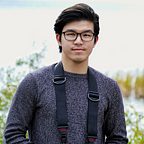
Written by Jonathan Choi
Passionate about living a meaningful life. I write about productivity, work life and data.
Text to speech
We’re fighting to restore access to 500,000+ books in court this week. Join us!
Internet Archive Audio

- This Just In
- Grateful Dead
- Old Time Radio
- 78 RPMs and Cylinder Recordings
- Audio Books & Poetry
- Computers, Technology and Science
- Music, Arts & Culture
- News & Public Affairs
- Spirituality & Religion
- Radio News Archive

- Flickr Commons
- Occupy Wall Street Flickr
- NASA Images
- Solar System Collection
- Ames Research Center

- All Software
- Old School Emulation
- MS-DOS Games
- Historical Software
- Classic PC Games
- Software Library
- Kodi Archive and Support File
- Vintage Software
- CD-ROM Software
- CD-ROM Software Library
- Software Sites
- Tucows Software Library
- Shareware CD-ROMs
- Software Capsules Compilation
- CD-ROM Images
- ZX Spectrum
- DOOM Level CD

- Smithsonian Libraries
- FEDLINK (US)
- Lincoln Collection
- American Libraries
- Canadian Libraries
- Universal Library
- Project Gutenberg
- Children's Library
- Biodiversity Heritage Library
- Books by Language
- Additional Collections

- Prelinger Archives
- Democracy Now!
- Occupy Wall Street
- TV NSA Clip Library
- Animation & Cartoons
- Arts & Music
- Computers & Technology
- Cultural & Academic Films
- Ephemeral Films
- Sports Videos
- Videogame Videos
- Youth Media
Search the history of over 866 billion web pages on the Internet.
Mobile Apps
- Wayback Machine (iOS)
- Wayback Machine (Android)
Browser Extensions
Archive-it subscription.
- Explore the Collections
- Build Collections
Save Page Now
Capture a web page as it appears now for use as a trusted citation in the future.
Please enter a valid web address
- Donate Donate icon An illustration of a heart shape
Ikigai: The Japanese Secret To A Long And Happy Life
Bookreader item preview, share or embed this item, flag this item for.
- Graphic Violence
- Explicit Sexual Content
- Hate Speech
- Misinformation/Disinformation
- Marketing/Phishing/Advertising
- Misleading/Inaccurate/Missing Metadata
plus-circle Add Review comment Reviews
4,687 Views
28 Favorites
DOWNLOAD OPTIONS
For users with print-disabilities
IN COLLECTIONS
Uploaded by SV40 on October 28, 2023
SIMILAR ITEMS (based on metadata)

Ikigai by by Héctor García & Francesc Miralles is book which talks about finding your purpose and then following it with all heart to live a happy and satisfying life. The authors take us in this search along with them and make us understand how people of Japan have been living a long and a happy life.
Are you worried about leading a happy and satisfying life? Or, do you often worry if you are living the true purpose of your life? Or, are you stuck in a job that is not your passion?
If you are looking for the answers, this summary of the book Ikigai is just for you as we are going to address all these queries a few moments from now.
Today we will discuss the book “Ikigai” by Hector Garcia and Francesc Miralles .
Ikigai is a Japanese secret concept that tells you about longevity and happiness. This book tells us how by following the Japanese concept of Ikigai, you can make your life long and happy.
It is a fact that people living on Okinawa Island, Japan, live the longest and happiest life. According to the World Health Organization (WHO), the world’s highest life expectancy record is in their name, but what is their secret?
Its secret is Ikigai, which is a Japanese concept. It means the joy of being busy.
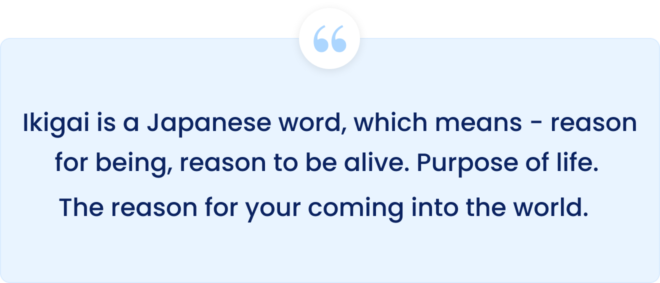
Ikigai is a Japanese word that means – the reason for being, a reason to be alive. Purpose of life. The reason for your coming into the world.
The Japanese believe that every person has at least one Ikigai, which they get after understanding themselves. Ikigai is hard to find.
People’s whole lives go out looking for it. You will be surprised to know that you also have an Ikigai.
Reasons for reading Ikigai
The authors say about Ikigai that this is a concept of our Ikigai, which helps make the body strong so that we can live longer.
Once you feel like you have no clear purpose for living, no matter how healthy your other daily habits may be, your life span can be seriously shortened.
And research has shown that there is a hack in life. Having a goal can prevent the development of genes associated with inflammation in the body, as well as slow down the process of cell death.
Along with this, the authors of this book give us the following reasons:
1. It shows the purpose
It could be as little as finding a better job or looking to buy a home, cooking a special, or passing an exam. But it helps us to be active. Because our goals, no matter how big or small, keep us going, which allows us to be active and happy.
But to start anything, first of all, knowing about it and deciding the purpose is essential, as it is crucial to allocate the time to start health, wealth, or business.
The author tells his story and says that when he became aware of his big goal, he started getting peace and happiness in every small and big work related to it, and every action made him feel that his life would be happy, which is true today.
It also gave peace to his mind that he is living a purposeful and meaningful life. Even though he sometimes got minor failures, focusing on the goal was essential to his happiness.
2. It inspires happiness
We often miss some of the most critical moments we like or need to be in our busy lives. But Ikigai advises that instead of being grateful for them, we should focus more on living those moments the next time we get the chance.
This book gives you tips to imagine in your mind your happy activities, your best moments, present moments and how it looks, and how good you feel in them.
Because we seldom notice that, instead of how well we can do in the present, we keep worrying about the future.
Therefore, taking time out and think about where I am in life, where I want to reach, and the necessary things to do to help human happiness and peace of mind both in the present and future.
3. Happiness lies in simplicity
The people of Japan like simplicity. Many people have made significant inventions, written books, researched, and achieved great success, but they give importance to simplicity in life.
They believe the spirit of being together, an active daily routine, matters for a peaceful, healthy, happy, and long life. Apart from this, the Okinawa residents of Japan also give a mark of kindness.
4. It promotes health awareness
The book Ikigai makes us aware of how to be healthy; it tells us to constantly move the body to be active and to keep it at the moment; you can walk or walk in your row in the office or do your desired activity.
5. It helps in increasing positivity
Apart from this, this book also helps us to stay positive while teaching our desired work and positive thinking.
Find your Ikigai
Here are the 12 steps suggested to find your Ikigai about whom we will talk in detail. Understand every step very carefully because every step can change your life completely.
Step 1: What is the meaning of life?
What is the meaning of your life? This question haunts all of us at some point or the other. Could you take a look at it? If you find the purpose of your life. That purpose of life we are looking for.
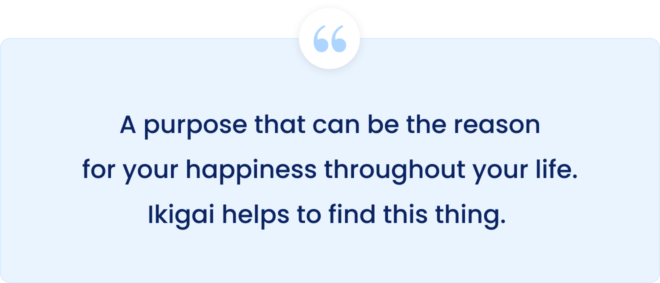
So understand, one will find a reason to wake up in the morning and sleep peacefully at night. A purpose that can be the reason for your happiness throughout your life. Ikigai helps to find this thing.
To find your Ikigai this way, you should ask yourself these four questions:
Question 1: What is love?
This question is probably the easiest. For this, think about what work you like best, which gives you energy, which you enjoy doing. In doing this, you stay energized and energized. This can be anything. Like – painting, singing, cooking, teaching, reading, traveling, or Youtube like me, etc. Any work that attracts you a lot. This could be your office work. Family work can happen. This can be your interest.
Question 2: What are you good at?
What work are you good at? In which work are you an expert? What skills do you have? In which you are already good naturally, or you have an interest in doing and learning it.
It can be different for each one. Therefore, find such a thing in which even if you have a little bit of natural skill, even if there is no perfection, then it will come slowly while doing it.
Question 3: Do you get paid for this?
If you talk only about love and good, then you can like to do anything. But it is optional that for this thing, you should be paid. Maybe you love cleaning the house. But for this thing, no one will pay you. So find some work that the world also needs so that they will pay you in return.
Question 4: What does the world need?
For this, you see, whether the people you like need anything. So what does the world need from these so that their problem can be solved? So that you can solve people’s problems through your favorite work and improve your lifestyle by earning money.
Step 2: Knowing Ikigai and knowing the circle
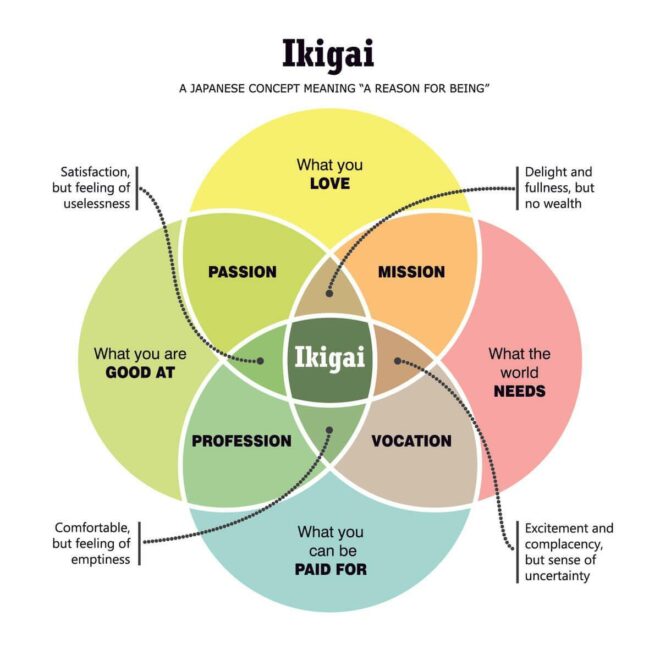
1. Know the Passion
What is expected is called your passion between the first and the second circle. That is, do whatever work you like, in which you are good too. That is called your passion.
2. Professional Circle
Circle between the second and third circles; what is expected is your profession. That is, the work you are good at.
3. Vocation Circle
Between the third circle and the fourth circle, what is expected is your vocation. That is, for whatever work, you can get money. In the same position, if the world even needs it, it can become your vocation.
4. Mission Circle
Between the fourth circle and the first circle, which is expected, is where your mission lies. That is what the world needed. You loved doing the same thing. So that becomes your mission, and both benefit.
In this way, if there is some work you like to do in your life, you are also better at that work than others, then you can get money also. And according to you, people need that work in the world too. So much work is called in Japanese – Ikigai.
To live a happy and fulfilling life, you’ll have to find your Ikigai. And when you see your Ikigai in your life, only then can you live a fulfilling life; otherwise, always in life, something will remain incomplete. And for all this, with all sincerity, you have to find answers to these four questions.
Step 3: How to find your Ikigai?
First of all, make a big square. Then, divide it into four equal square parts.
Write in the first square: I love this work and am also an expert in it. You write all those things in it which you love to do and are an expert in them.
Write in the second square: I like this job but don’t know how to do it well. That is such work that you love very much. But they don’t let you do it. But your heart does too much to make that work.
Write in the third square: Just not my cup of tea. But they have to be done. That is, doing things you don’t like to do. But it has to be done under compulsion. If you don’t like programming, it has to be done to stay in the job and earn money.
Write in the fourth square: Just not my cup of tea. I can’t even do well. What are things that you don’t even like? You are not even his expert. Still, you have to do it under compulsion, like you have to clean your room.
After writing these, you see that in what activities do you spend most of your time? How much time do you spend doing those things?
Which you are good at and you also like. How long do you spend doing something you don’t like? The author recommends doing this because most people spend more time doing work they do not like. That’s why they can’t get their passion. And there is a feeling of incompleteness in life.
Meaning that such people spend more time in the bottom two squares. But to find your passion, you should devote more time to the above two works.
You should spend more time on the above tasks without quitting your job. In these tasks, please focus on the ones you like the most and enjoy doing them too. By which later on, you can earn money too.
And have faith that you will find your Ikigai if you look for it honestly.
Step 4: Four Secrets of long, happy life and healthy living
Some particular habits are included in the life of the people of Okinawa, Japan. Because of this, they live a long, happy, fulfilling, and quality life.
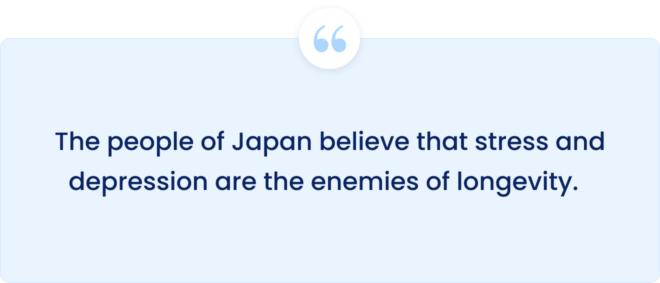
The people of Japan believe that stress and depression are the enemies of longevity. Therefore, stress should always be avoided to lead a happy life.
2. Food and drink
People of Japan never eat full stomach; they always eat only 80% of their hunger. For this, when you eat food, stop eating immediately as soon as your stomach is about to fill. Initially, you may not know when you have eaten 80% of your food, but you will learn as you do it slowly.
In a recent study, it has been found that the people of Okinawa consume an average of 1800 to 1900 calories per day; apart from that:
- The people of Japan eat an average of 18 different types of foods every day.
- Take five servings of fruits and vegetables daily containing different colored capsicum, carrot, spinach, cabbage, potato, legume, and soybean.
- 30% of the calories of the people of Japan come from vegetables only.
- Wheat is the foundation of Japanese people; they eat white rice daily.
- Fish is eaten three times a week.
- Salt is eaten on an average ranging from 7 grams to 12 grams.
- Apart from this, Japanese people also consume green tea and white tea.
3. Doing one thing at a time
Whatever work you do, having focus brings flow to your work so that you can do that work very quickly and without getting tired.
Therefore, always choose the work you have to research; you will have to work hard, and your mind will always have to think so that your focus remains.
We feel that doing more than one thing at a time saves time and can finish more work in less time, but the scientific evidence of doing this is just the opposite.
Research has proved that people who do more than one work at a time finish the work late and are not productive at all while doing that work.
That’s why we should do only one thing simultaneously with complete focus.
Step 5: Ikigai retirement and health lessons
Did you know there is no word like retirement in Japanese? The people of Japan never retire from their work; they keep on working their whole life.
On the other hand, if we talk about other countries, people need early retirement. They should get rid of their work by any means which happens because they do not love their work.
When you do any work forcibly or just for money, then you are not happy with that work. The company you work for also does not get more value from you.
Therefore, to live a long and happy life, you should love your work; then, you will never think of retirement because your happiness will now be in your work and not sitting at home and rusting your body.
If you sit for too long, you will get old sooner. Sitting for a long time may give you physical comfort, but it will damage your cells, and cause food imbalance, hypertension, and even cause cancer.
And to avoid this, you should add these few habits in your daily life:
- Walk for at least 21 minutes daily
- Do not use a lift or elevator
- Participate in social activities so you do not sit in front of the TV for a long time.
- Replace your junk food, and packaged food with good food
- Get good quality sleep, and take 7 to 9 hours of sleep. Do not sleep more than this
- Play with your children or your pet
- In the beginning, you can also set a timer so that you remember that it is time to walk,
- You can also use the app from Google, which gives you the task of walking daily.
Step 6: Focus on Work
It is essential to have focus while doing whatever work you do. Having focus brings flow to your work so that you can do that work very efficiently and without getting tired.
To bring focus and flow to the work, you should follow the mentioned things:
1. Choose the hard work
As we discussed earlier, always choose the work that you have to do research on. You will have to work hard, and your mind should always be thinking so that your focus remains.
Keep in mind that do not choose any such work which is out of your ability and it is so difficult for you to do it that after a few days, you stop doing it. Don’t even do what is easy for you as you will feel bored. Stop doing it.
2. Clear objective
Before starting any work, you should have a clear objective of doing it, what you have to do, when to do it, and why to do it. You should know all these things in advance. There should be a deadline so that you can finish it on time and not postpone it further.
3. Only one task
And as we have known earlier, only one thing at a time.
Step 7: 10 Short rules of success through Ikigai
- Surround yourself with good friends
- Live life at a slow pace
- Do not fill your stomach entirely while eating.
- Make your body in shape
- Be in the present
- Always smile
- Be active, don’t retire
- Connect with nature
- Learn to be grateful
- Find and follow your Ikigai
Step 8: Okinawa elder’s advice
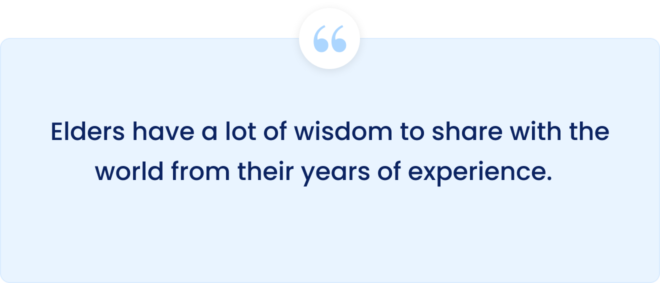
Elders have a lot of wisdom to share with the world from their years of experience. Those of us young can sometimes pretend we know everything, but we should learn essential things about life from generations senior to us, who know better than us.
And at the same time, focus on enjoying life with what you have rather than what’s going wrong or isn’t.
A great way to do this is to connect with everyone around you, even strangers. And that’s what the old-timers in Okinawa suggest: smile and talk openly to everyone you meet.
The friendly attitude that develops from this will help you develop friendships with many people throughout your life.
Okinawa elders also recommend building such loving relationships and maintaining those relationships.
To learn more about making friends, please read the summary of “How to Win Friends and Influence People.” The link is just down below:
How to Win Friends and Influence People
Step 9: keep moving throughout the day.
Okinawa residents suggest you are not required to play a sport or run to be healthy. For this, you can decide on any running work according to your convenience.
Because speed can inhibit consistency from the start, Okinawans try to keep their forms of running exercise simple. Jogging around, days in the garden, or singing for fun are just a few simple ways they go through the bar.
Keeps up the pace. Apart from this, Radio Tasso, a Japanese radio show, has helped Okinawas to exercise for years. It plays tunes in a big station in Japan, and people listen to the directions to exercise.
To maintain body and mind movement, you should also get up in the office for some time and walk in your row or office.
Step 10: Japanese people’s secret to living a long life
Japanese elders share these five secrets to living a long life:
1. They Don’t worry
The secret to a long life is not to worry. And to keep your heart young, don’t let it grow old. Open your heart to people with a friendly smile on your face.
If you smile and open your heart, your grandchildren and everyone else will want to see you. The best way to avoid worrying is to get out and socialize.
Older people in Japan often do this. That’s why they have been able to live so long. According to them, you need to be happy instead of worrying about living a long life.
Spending time with others without causing trouble to anyone and having fun is all that matters.
2. Cultivate good habits
Good habits matter the most for long life. In today’s time, getting up late has become the most significant bad habit.
Your body is not active, due to which your body becomes tired. So, first of all, make a habit of getting up early and doing some work in the morning , which will make your body agile.
Do something that relaxes you. You can run or walk after getting up early in the morning.
You can also do some work at home, like yoga, watering plants, or planting new plants. After this, come home and make breakfast with your hands.
Use green vegetables in your breakfast. Just find your Ikigai no matter what you’re doing. The key to staying sharp in old age is at your fingertips. If you keep your fingers busy, you can live for 100 years.
Remember that if you do not work after getting up in the morning, your body becomes weak. After this, pray to God for your good health and good life.
And do these things consistently every day. Keep in mind – eating vegetables helps you live longer. You need to do three things to live a long time:
- Exercise to be healthy
- Spend time with people.
3. Nurture your friendships every day

Keeping in touch with your friends, keeps adding another year to your life. Because your friends are those people who make you feel happy and memorable.
And being with friends is the most pleasurable thing in life. The people you love are the secret to a long life. To understand the importance of this thing and spend time with friends.
Chatting, drinking tea, and singing with your neighbors are the best things in life. Go to new places with your friends; it will make you happier. The secret of a long life is mixing with people and moving from place to place.
4. Live an incomplete life
For long life, focus on doing ‘slow’ and ’at ease.’ If you are not in a hurry, you will live longer. Many old men in Japan share this secret to live longer.
They wake up early, exercise, and have a good breakfast. And when they get tired after all this, they meet their friends.
Doing many different things every day prolongs your life. Nowadays, people are very busy due to their busy schedules, and sometimes they also become overwhelmed with their work.
But doing so can never increase your life. Therefore, when crushed, focus on one task at a time. By doing this, you can also complete your current work correctly. Remember, the secret to a long life is to go to bed early, rise early and go for a walk.
If you live in peace, enjoy small things, and meet your friends, no one can stop you from living more.
5. Be optimistic
Tell yourself every day, ‘Today will be a day full of health and energy. Live it to the fullest.’ Of course, no matter how old or weak you may feel, tell yourself I still have much to do.
And laugh out loud while saying this. Laughter is the most important thing. Wherever you go, laugh there; it will put you and the person living with you in a good mood.
And you will get the motivation to work. The mood in which you spend your time matters a lot. If you look at the statistics, people who are sad, unhappy, or angry die before people who laugh more and be happy.
So make laughing your priority. Consider yourself lucky to be in this life. Say thank you, and help others; it will give you a feeling of happiness and satisfaction. To live longer is in your hands; embrace it.
Step 11: Logotherapy to Ikigai
People are not happy due to a lack of purpose in their lives. Due to a lack of meaning in life, life does not seem meaningful.
And it becomes the reason for your sadness, which makes it impossible to be happy for a long time. Even many people give up hope and try suicide, which is a big problem. You can use the logotherapy technique mentioned in the book to overcome this problem.
Logotherapy… What is it?
Logotherapy inspires patients to consciously search for their life’s purpose to confront their neurosis. Their search to fulfill their destiny leads them to mental blocks of the past, breaking and overcoming all obstacles that stand in the way.
The process of logotherapy steps can be best understood in these five steps:
- The person feels empty, hopeless, or anxious.
- The therapist shows him that he desires to have a meaningful life.
- By which the patient comes to know his life’s purpose at that particular time.
- He decides to accept or reject his destiny with which his whole life is connected.
- And when the patient finds this new passion. This new passion of his helps him to overcome obstacles and sorrows.
If the person needs help doing this, logotherapy helps him by visualizing the picture. He needs guidance in the search for his life’s purpose and overcoming troubles to move toward his purpose. According to logotherapy, discovering one’s life purpose helps the individual fill that gap.
Step 12: Important lessons
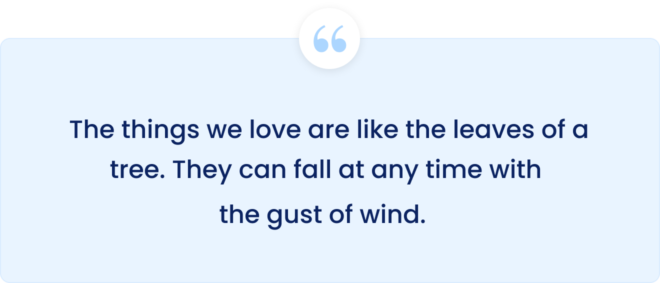
Life lessons from the book:
- An intelligent person should not avoid the pleasures of life but should always be aware that dependence on them can make him a slave to satisfaction. That’s why you should make it a habit to be happy from the heart instead of being prepared for those pleasures which vanish in no time.
- The present is everything that exists, and it is the only powerful thing we can control and through which we can control our today and future life.
- The things we love are like the leaves of a tree. They can fall at any time with the gust of wind. Everything we have, and the ones we love, will eventually disappear. So we have to be aware to be happy with it without being pessimistic about it. We should be happy in the present, which helps us avoid much pain during loss.
- There is no exact plan to connect with our Ikigai. So don’t worry too much about finding it. Just be engaged in what you love while surrounded by people who love you.
- We don’t make meaning of our life; we find it by doing the work we love, so we do the work passionately.
- Each one of us has a unique reason to be alive. Find it and live life to fulfill the purpose of life.
Daily healthy habits:
- Japanese stop eating when their stomach is 80% full.
- Stress is a proven killer. While challenges in life are suitable for keeping the mind and body active, we should focus on solving the fundamental challenges and avoid the rest.
- Take rest. Start slow and keep doing it. Eat well and sleep. Everything is fine. Life is a marathon, not a 100m sprint.
- Keep your mind and body busy.
- People with a clear purpose never retire and stay with their passion till their last breath.
- Smile and meet people.
- Work hard, but on your Ikigai. Work as little as you can on the rest.
- Just get started, and start with the most accessible and most comfortable steps. Keep improving it with time and information.
Eating habits
- Eat everything in a little. Diversity is key. Eat a variety of foods, especially vegetables.
- Apart from this, the people of Okinawas rarely eat sugar. But no sweets or chocolates or negligible, so diseases like sugar are rarely heard in Japan. So to avoid sugar and stay healthy, you should also use this method.
- Eat lots of citrus fruits. They contain chemicals that prevent cancer, diabetes, and obesity.
So, friends, this is the secret of Japanese people’s happiness and healthy living, which is called Ikigai. We learned that more time, energy, and attention should be given to working passionately, adding value to people’s lives with the work you want so that you also work on your passion and people’s problems should be solved. And one should live for it by making a clear goal in life.
I hope you have learned about passion, happiness, and health. Now adopt them in your life and become successful by doing your passionate work.
Ikigai Book Review
So, I hope that you liked the summary of the book “Ikigai: The Japanese Secret to a Long and Happy Life” by Héctor García and Francesc Miralles. I found this book to be a treasure trove of wisdom and inspiration.
“Ikigai” is a Japanese concept that roughly translates to “a reason for being.” It’s the idea that a fulfilling and happy life comes from discovering and pursuing one’s true passion and purpose. This book takes you on a journey through the lives of the inhabitants of Okinawa, a small Japanese island known for its high concentration of centenarians, people who live well into their 100s.
The authors, García and Miralles, expertly weave together a narrative that is both engaging and informative, combining interviews, personal anecdotes, and scientific research. What I found particularly captivating was how they managed to uncover the secrets of the Okinawans’ longevity and happiness, and how these lessons can be applied to our own lives.
One of the key lessons I took away from the book was the importance of having a clear purpose in life. In Okinawa, people are encouraged to discover their “ikigai” early on and dedicate their lives to it. This resonated with me deeply, as I realized that I too needed to find my own “ikigai” and live a more purpose-driven life.
The book also emphasizes the importance of balance in life. Okinawans manage to strike a perfect balance between work, leisure, and social connections. This holistic approach to living was refreshing, as I often find myself caught up in the hustle and bustle of daily life, neglecting important aspects of my well-being.
One of my favorite parts of the book was the practical advice the authors provided for applying the concept of “ikigai” to our own lives. They propose simple yet powerful strategies like fostering a sense of community, staying active, and eating healthily. These are ideas that may seem obvious, but the way García and Miralles present them makes you see their importance with newfound clarity.
The prose is easy to read and engaging, making the book a pleasure to read. The authors’ passion for the subject matter is apparent throughout, and their genuine enthusiasm for the Okinawan way of life is contagious.
In conclusion, “Ikigai: The Japanese Secret to a Long and Happy Life” has had a profound impact on the way I view life and happiness. I highly recommend this book to anyone seeking inspiration, wisdom, or simply a fresh perspective on living a more fulfilling life. It’s a journey that will surely stay with me for years to come.
Similar Books
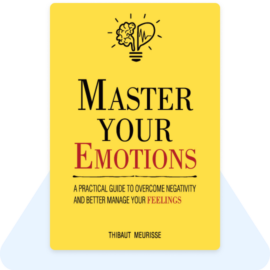
Master Your Emotions
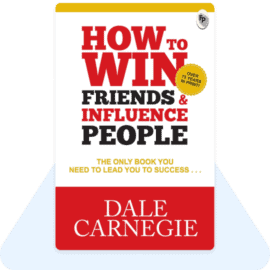
Men are from Mars, Women are from Venus
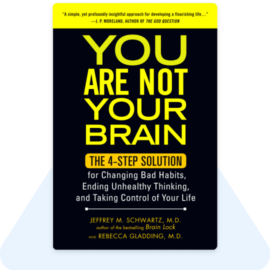
You Are Not Your Brain
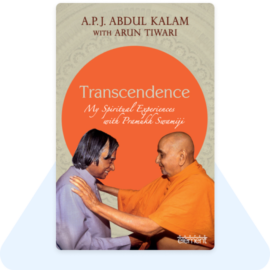
Transcendence: My Spiritual Experiences with Pramukh Swamiji
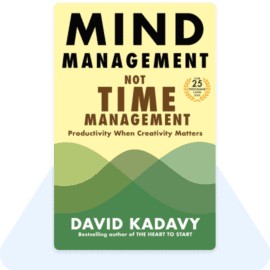
Mind Management Not Time Management
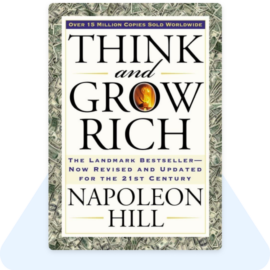
Think and Grow Rich
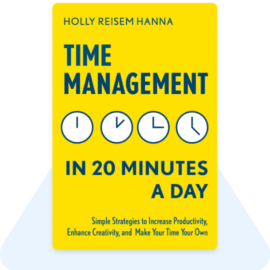
Time Management in 20 Minutes a Day
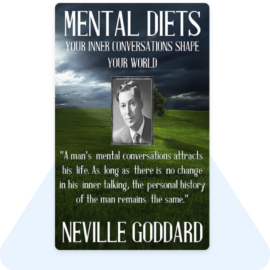
Mental Diets
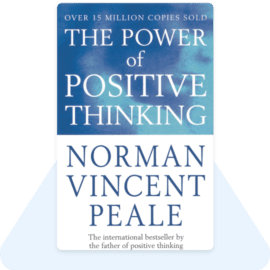
The Power of Positive Thinking
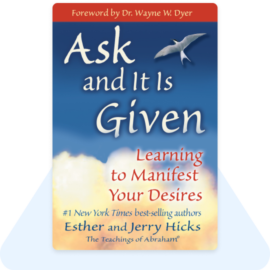
Ask and It Is Given
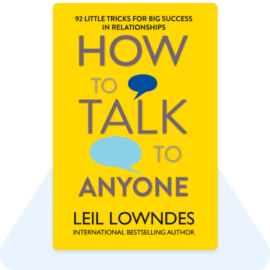
How To Talk To Anyone
173 thoughts on “ikigai by héctor garcía & francesc miralles”.
Day—9–ikigai is complete
Day 9. This book teaches us the Japanese Secret to a Long and Happy Life” explores the concept of Ikigai, which is the Japanese philosophy of finding one’s purpose in life. It provides insights and practical tips on how to identify and pursue your Ikigai, leading to a more fulfilling and satisfying life.
Day 9 book Ikigai This book summary helped me a lot to find the purpose of my life. Stay happy and healthy be happy.thankuuu Amit sir for amazing book summary.
Leave a Comment Cancel reply
Save my name, email, and website in this browser for the next time I comment.
Join Our Free Newsletter and never miss latest book summaries!
- Privacy Policy
- Terms & Conditions
- Affiliate Disclosure
Advertisement
N.K. Jemisin on the prescience and brilliance of Parable of the Sower
The Hugo award-winning author explains how she finally got to grips with Octavia E. Butler's dystopian novel, the latest pick for the New Scientist Book Club, on a third read
By N.K. Jemisin
30 August 2024

N.K. Jemisin
Laura Hanifin
There’s power in threes. The rule of three, we call it in the writing world: repeat a word or phrase or plot element three times in order to give it meaning. Two repetitions isn’t enough to establish pattern recognition; four repetitions and the mind gets bored. Three is the sweet spot.
It took me three tries to get what Octavia Butler was trying to do with Parable of the Sower and Parable of the Talents . I think. I’m still not sure. But I’ve now read these books three times, at three very different points in my life, and each reading has shown me just how powerfully prescient Butler was. The first read took place sometime in my mid-20s, as I struggled through grad school; the second was in my mid-30s, in the early years of my professional writing career; the third was just a few months ago as of this writing, so not long after I turned forty-six.
The mid-20s read would’ve been a few years after Parable of the Sower debuted in 1993. I’d known about the books since they came out, of course, but my earliest attempts to read Sower were bounce-offs. I was used to Butler’s more overtly science-fictional premises: post–nuclear apocalypse aliens (the Xenogenesis/ Lilith’s Brood books), time travel ( Kindred ), or telepathy and immortality (the Patternist/ Seed to Harvest books). In contrast to these, the Parables featured little in the way of scientific or technological advancements or out-of-this-world what-ifs. The books seemed to “merely” be set in the future.

Octavia E. Butler
Now, note: I was very much a baby black-power militant in those days. I joined sit-ins to demand that my school divest from apartheid South Africa, went to the Million Man March to help register voters, immersed myself in African American history, all of that. Yet my engagement with the ideas underlying my activism was surface level only; I hadn’t had time to actualize or syncretize much. I also hadn’t yet figured out how limited my own ambitions and expectations really were, largely because I couldn’t visualize a world that was actually better than the one I lived in. I’d spent my life absorbing statistics and societal narratives that predicted a dire future for me—if I even survived young adulthood. This was echoed by the fiction I read. Most of my favorite speculative works, like Star Wars and Star Trek and the “golden age” novels of science fiction, depicted a future that was shiny and exciting . . . for white guys. The rest of us were present only in token form, if we were present at all. Usually, we simply did not exist. There was no future for us, beyond whatever limited use the heroes might find for a few. (We were never the heroes.) And depictions like this were so ubiquitous in the speculative field that for many years I accepted them without question. Just more dire predictions. The radicalism of “merely” envisioning a future—while American, while black, while female—had not yet become a part of my consciousness.
In grad school, however, I became one of three black women in an intensely competitive sixty-person master’s program. As part of my program, I learned about racial identity development theories—that is, the process through which a member of a racist society moves from superficial engagement with race to a place of deeper, personalized understanding. As part of one class, we were asked to read Butler’s Kindred , which I’d already read, so I decided instead to finally tackle Parable of the Sower .

Our writers pick their favourite science fiction books of all time
We asked New Scientist staff to pick their favourite science fiction books. Here are the results, ranging from 19th-century classics to modern day offerings, and from Octavia E. Butler to Iain M. Banks
Still wasn’t ready; I know that now. However, I’d grown enough by then that Lauren Olamina no longer felt anachronistically know-it-all to me, as she had when I’d first sampled the novel. (She always read to me like an older woman’s idea of what a smart teenager should be, rather than a realistic rendering of what smart teenagers are actually like. Naturally, I like her better the older I get.) As an examination of racial identity development, the story doesn’t work at all; Lauren is basically born knowing that racism is systemic and that, as someone born at multiple intersections of marginalization (black, disabled, female, poor), she is doomed if she doesn’t work every angle possible. Kindred ’s Dana is a much better example of someone whose understanding of herself transforms radically over the course of a story; Lauren starts deep and stays deep. However, Parable of the Sower works beautifully as an examination of how smart resistance functions—and I, growing jaded with respectability politics, black patriarchy, and other shallow solutions to the problem of racism, needed that badly. I needed to know how to bide my time. I needed to understand the difference between good intentions and good outcomes. Understandably, I found a lot to empathize with in Lauren’s struggle between being a “good girl” and being a grown woman with needs beyond what parental guidance can provide.
Still, I didn’t like the books, not back then, nor did I find them particularly prescient. For context, this was the 1990s. The dot-com boom had begun to democratize society in new ways, by giving a blog and a platform to anyone who could yell loudly or market themselves cleverly enough. The Gulf War was over, crack was wack, and the economy was booming so much that taking on thousands of dollars in student loan debt didn’t sound like a terrible idea to me, at the time. Lauren’s world still felt unrealistic to me, even impossible. Roving, uncontested gangs of pedophiles and drug-addicted pyromaniacs? Slavery 2.0? A powerful coalition of white-supremacist, homophobic Christian zealots taking over the country? Nah, I thought, and hoped Butler would get back to aliens soon.
Yeah. Okay. Look, I was young.
The mid-30s read, in the late 2000s or so, hit me in the middle of a career-specific encounter with institutional racism. I’d decided to become a writer by then, by profession rather than just hobby, and had added my voice to others demanding change within this genre of possibility. Octavia Butler, to our collective horror, died in 2006. Yet here were we, her spiritual children numbering in the thousands, come to claim the future. By this time I’d begun to understand just how rare, and how strange, the mere idea of thinking about the future was, for those of us from marginalized backgrounds. Worse, I’d seen how complicit science fiction and fantasy were in making our futures so hard to imagine. It was time for this to change. We weren’t asking for much from our fellow writers: just more than European myths in our fantasy, and more than token representation in the future, present, and past.
But that fight is when I saw far too many of my once-favorite writers and editors reacting to our demand for a future and our existence in the present as if both were a threat. So we fought them. Of course we did; Butler’s memory demanded no less. But I won’t pretend I wasn’t heartbroken by how hard it was to make presumably intelligent, well-meaning people understand just how much harm they were doing.
That’s when I paid more attention to a thread in the Parable s which had frustrated me to no end during that first read-through: the story of Marc, Lauren’s younger brother, thought dead at first and later rescued from horrific sexual slavery. Marc understands pain, in spades—and yet he eventually betrays Lauren, because he cannot acknowledge her pain without also acknowledging the harm that his fellow militant evangelicals have inflicted on others. He isn’t an evil man; throughout the two books, he helps many, though always (and only) within the framework of the Christianity he embraces. Eventually, though, his need for the status quo, for conformity, trumps his basic goodness. “I cannot help you until you suffer the way I want you to suffer, express your pain in a way that pleases my ears—and stop doing both when I’ve heard enough,” is what he seems to say.
This resonated powerfully with me amid the ongoing context of the American social justice movement. For every attempt made by marginalized people to express anguish and seek change for historical (and ongoing) harm, there’s always pushback from those who demand that we suffer only in the expected ways, express that suffering with an acceptable tone, and end both our suffering and our complaints on demand. Marc’s ultimatum was the exact refrain of those SFF figures I once admired, as they proceeded to question why we demanded a better future, how that demand should be framed, and whether we deserved it. After that, I couldn’t help wondering how much of Marc was informed by Butler’s fellow authors. Maybe none. Or maybe Butler’s message is that Marcs aren’t exactly rare in our society—so anyone who wants to understand and guide positive change, like Lauren, must also be prepared to work around them.
Then we come to the mid-40s read. Right now.
All that you touch, you Change. All that you Change Changes you.
What we have touched has changed: the SFF genre has improved slightly, despite its plague of Marcs. Instead of just Butler and a handful of others, now there are dozens of published black writers—and disabled writers, queer writers, indigenous writers, and more. But what we have changed has changed us in turn; I and other marginalized writers must be constantly braced for internet harassment, death threats, and campaigns to Make Science Fiction Racist Again. And as science fiction reflects its present, the same ugliness afflicts our society on the macro scale. In the wake of America’s first black president, we now endure an incompetent crook and bigot. We are more wired than ever, able to enact change through crowdsourcing and callout culture, for good or for ill . . . but most of us are less hopeful, more tired, struggling to keep the future in mind as a handful of powerful figures seem determined to drag us back to Jim Crow. Climate change looms. Human beings are resilient and resourceful; there’s little doubt that as a species we’ll survive. And those of us who want a better world will doubtless prevail, just as Lauren Olamina eventually did . . . but it may take everything we have.
So this time around, what I find myself resonating with most is Earthseed itself. Butler does not appear to have intended the Parable novels to be a guidebook—and yet they are. That’s true for all of the most powerful science fiction novels: they offer not only accurate visions of the future, but also suggestions for coping with the resulting changes. We can only imagine what that vision might have included if Butler had been able to complete it; she apparently had planned a third novel, Parable of the Trickster . But maybe it’s just as well that she and Lauren were unable to “discover” that third book of Earthseed. Now, like the communities of Earthseed, it’s our job to create change in fiction and in life. Like Lauren, these days I am comforted not by the platitudes I was raised with, but by the idea that change is a tool I can shape to my advantage, if I am clever and lucky. Claiming the future will be an ugly, brutal struggle, but I’m prepared to go the distance in that fight. The future is worth it.
And in ten more years? I’ll check in again, and see what else I can learn from these brilliant books.
—N. K. Jemisin December 2018
Extract taken from N.K. Jemisin’s foreword to Parable of the Sower by Octavia E. Butler, published by Headline, the latest pick for the New Scientist Book Club . Sign up to read along with us here .
- Science fiction /
- New Scientist Book Club
Sign up to our weekly newsletter
Receive a weekly dose of discovery in your inbox! We'll also keep you up to date with New Scientist events and special offers.
More from New Scientist
Explore the latest news, articles and features

Environment
Read an extract from octavia e. butler's parable of the sower.

The best new science fiction books of August 2024

Imagining Nigeria as ground zero in an alien invasion

Read an extract from Tade Thompson’s science fiction novel Rosewater
Popular articles.
Trending New Scientist articles

IMAGES
VIDEO
COMMENTS
Ikigai by Hector Garcia and Francesc Miralles is a definite eye-opener. I picked this book because of its hardcover tbh. It looks beautiful and I just couldn't think of not having such a beautiful book on my shelf. But recently I read this book and I gotta say, it is such an eye-opener. I would recommend this book to all book lovers.
Book Review: Ikigai. 👏Book👏Review👏. Hey all, Read Ikigai: The Japanese secret to a long and happy life. It's pretty famous and was trending when I picked it up. I thought I'd share my thoughts on it. If there's any feedback on the review, or if you had a difference with the book, I would love to hear your thoughts.
It's better to try and fail than not having tried at all. If you haven't found your ikigai ask yourself what makes you come alive and go after it that like your life depends on it. That's your ikigai. It lies in the intersection of passion, mission, vocation, and profession.
Basically, "Ikigai" is a Japanese concept that loosely translates to mean 'the reason to live', 'the thing that makes life worth living,' or according to the authors Héctor García and Francesc Miralles, "the happiness of always being busy.". Now, this seemed a little contradictory to me because 'always being busy' does not ...
The authors also offer practical exercises and suggestions to help readers find their ikigai and pursue it with purpose and joy. Overall, "Ikigai: The Japanese Secret to a Long and Happy Life" is an inspiring and transformative book that provides readers with the tools they need to live a more fulfilling and happy life.
This book is mainly an exploration and investigation of the world's centenarians — people who live past their 100s. How they live, how they approach life, those types of things. The main focus ...
This book isn't just a page-turner; it's a roadmap to living your best life, Japanese style! Forget dragons and treasure chests; here, we're hunting for the elusive "Ikigai.". Ikigai pronounced "ee-kee-guy," is not just a word; it's a melody, a dance, and a recipe for a life that sings with purpose. Join me on this adventure as ...
The book suggests that incorporating these habits into your life can cultivate a more Ikigai-aligned lifestyle that promotes longevity and well-being. B. Practical Tips for Finding Your Ikigai :
Read 4,776 reviews from the world's largest community for readers. 3 Books Collection Set: Ikigai: ... Just read Ikigai and quite enjoyed it and was about to review but can only rate and review for these three books which includes the Hygge book which I found awful. Will rate and review when this has it's own entry. 9 likes. Like. Comment.
This review delves deep into the book "Ikigai," co-authored by Héctor García and Francesc Miralles, which serves as a comprehensive guide to understanding and embracing this transformative concept. By the end of this journey, you'll have gained valuable insights into "Ikigai" and how it can revolutionize your life.
Ikigai is doing something where your heart is and that will get you into a flow. Ikigai can also be a microflow, where you enjoy daily routine tasks like doing the dishes. For this reason, Bill Gates for example does his dishes every night. It helps him to relax and he tries to do it better every day.
"We find ouw ikigai by concentwating on what is impowtant, wathew than what's uwgent. By constantwy keeping an eye on what feews good, we awe abwe to discovew what ouw passion is." Thewe is a weason this book is an intewnationaw bestsewwew. The tewm "ikigai" is expwained in vawious ways.
Bring meaning and joy to every day with ikigai. IKIGAI is a distinguish read for me. I learn a lot of things from this book. This book is about the life and culture of the people living at Okinawa island in Japan.This island is famous for the longevity of its people.There are almost 22.55 people over the age of 100 for every 100,000 inhabitants—which is far more the the global average.
Written by the Spanish health and lifestyle authors; Hector Garcia and Francesc Miralles, one of their many books on Japanese culture, Ikigai is a self-improvement book about finding meaning in life and how having a sense of purpose contributes to longevity. Ikigai is a beautifully nuanced concept, rooted in Japanese culture and can be translated as "the happiness of always being busy ...
It just flows. From one meaningful set of advice to another. Although it gets a little too detailed towards the end, it still feels like a high-note ending to a long saga song. Overall, a very ...
Héctor García is a Japanese-Spanish author who has written several books about Japanese culture, including two worldwide bestsellers, A Geek in Japan and Ikigai. A former software engineer, Héctor worked at CERN in Switzerland before moving to Japan. He has now lived in Tokyo for over 16 years. Francesc Miralles is a Catalan international ...
Speaking of Ikigai, here's one book I came across and it's worth the read. Ikigai: The Japanese Secret to a Long and Happy Life is a moving and well-researched story of the inspiring lives of Japanese supercentenarians (those who have lived over the age of 110) from Okinawa, the world's longest-living society.
It's kinda weird for me, I have tried reading them and just couldn't do it so I guess I should agree but imo it depends person to person and it all comes down to how much you are able to take in from the book and then later actually apply in your own life, though it's true that most people don't really apply much and get influenced for this sorta stuff from like a week or two max and get back ...
In researching this book, the authors interviewed the residents of the Japanese village with the highest percentage of 100-year-olds—one of the world's Blue Zones. Ikigai reveals the secrets to their longevity and happiness: how they eat, how they move, how they work, how they foster collaboration and community, and—their best-kept secret ...
Ikigai is personal — What we love is highly subjective. While we might be uncomfortable to say that we know what we love, I think we will know it when we feel it.
And according to the residents of the Japanese village with the world's longest-living people, finding it is the key to a happier and longer life. Having a strong sense of ikigai —where what you love, what you're good at, what you can get paid for, and what the world needs all overlap—means that each day is infused with meaning. It's ...
Remember: Infographics are learning tools, guides are reference tools. Sometimes it's grey. Ikigai: The Japanese Concept Of Finding Purpose In Life. As a "professional" I guarantee being good at your job is 0% required and most people are winging it. As a fellow 'professional' I would say I'm better at being a 'professional' than being good at ...
Ikigai Book Review. So, I hope that you liked the summary of the book "Ikigai: The Japanese Secret to a Long and Happy Life" by Héctor García and Francesc Miralles. I found this book to be a treasure trove of wisdom and inspiration. "Ikigai" is a Japanese concept that roughly translates to "a reason for being."
The Hugo award-winning author explains how she finally got to grips with Octavia E. Butler's dystopian novel, the latest pick for the New Scientist Book Club, on a third read